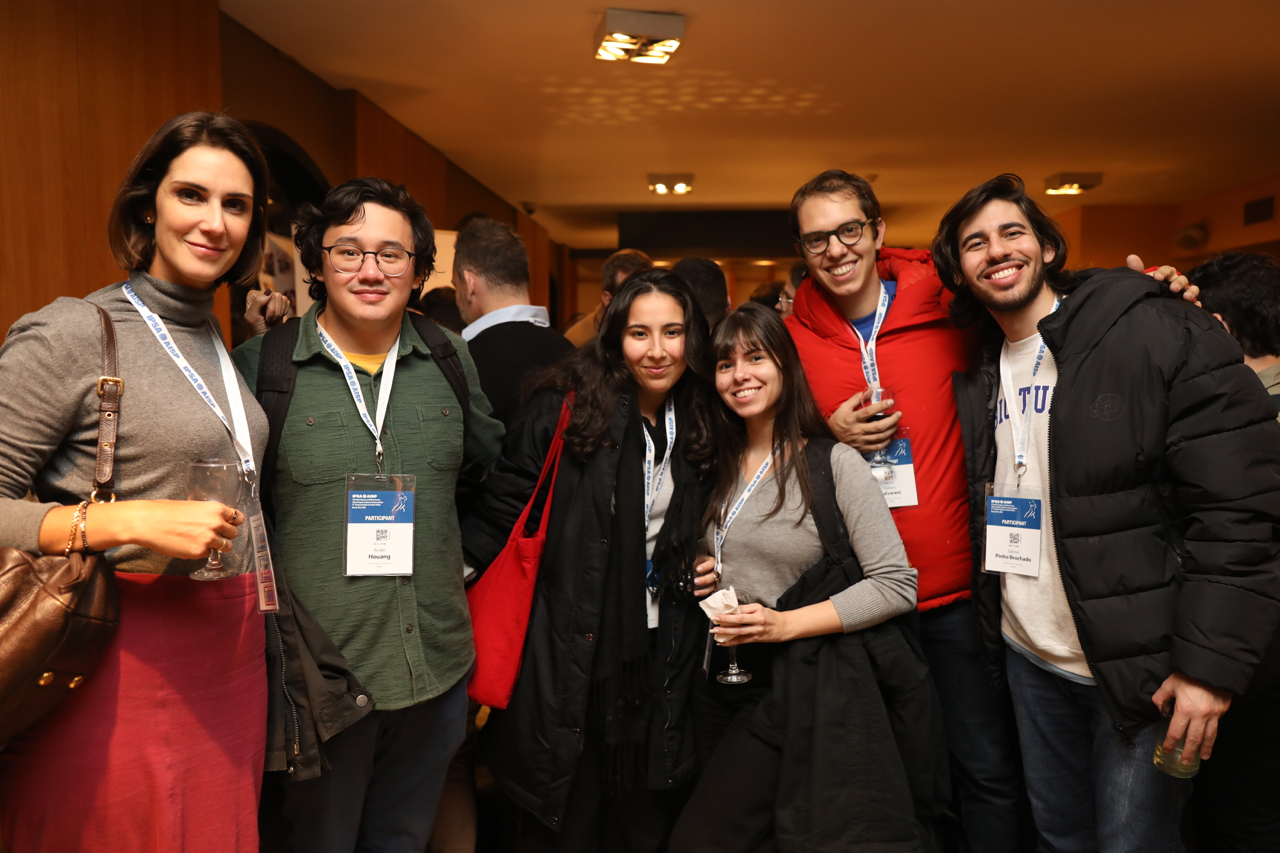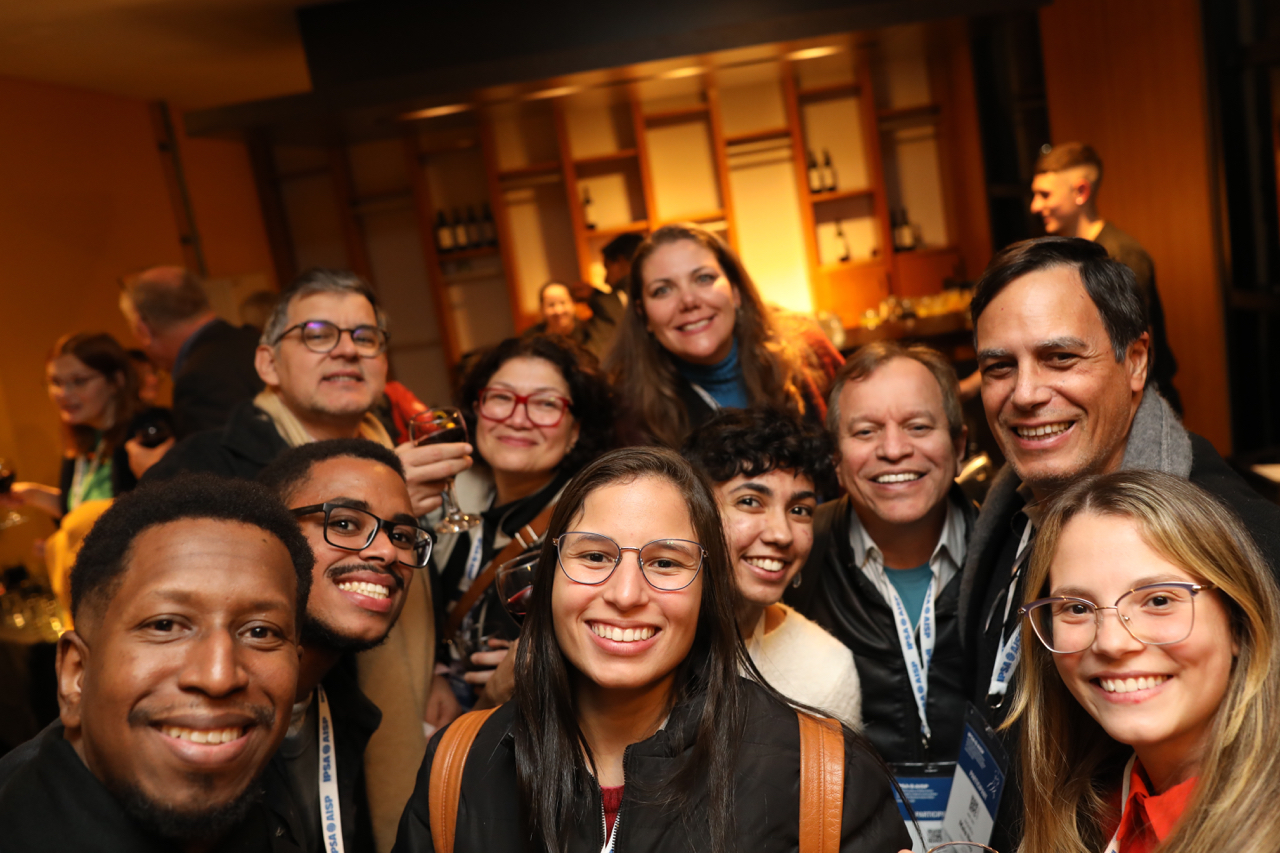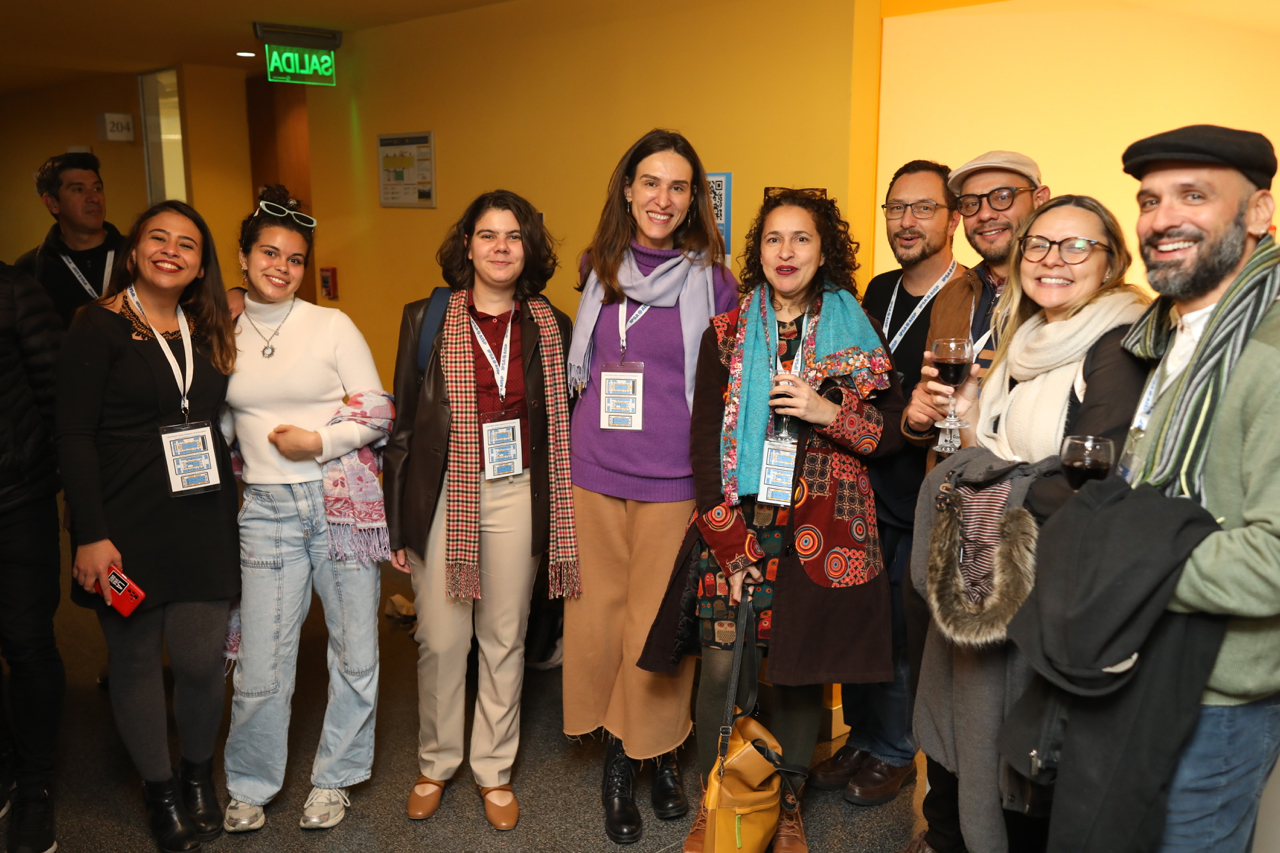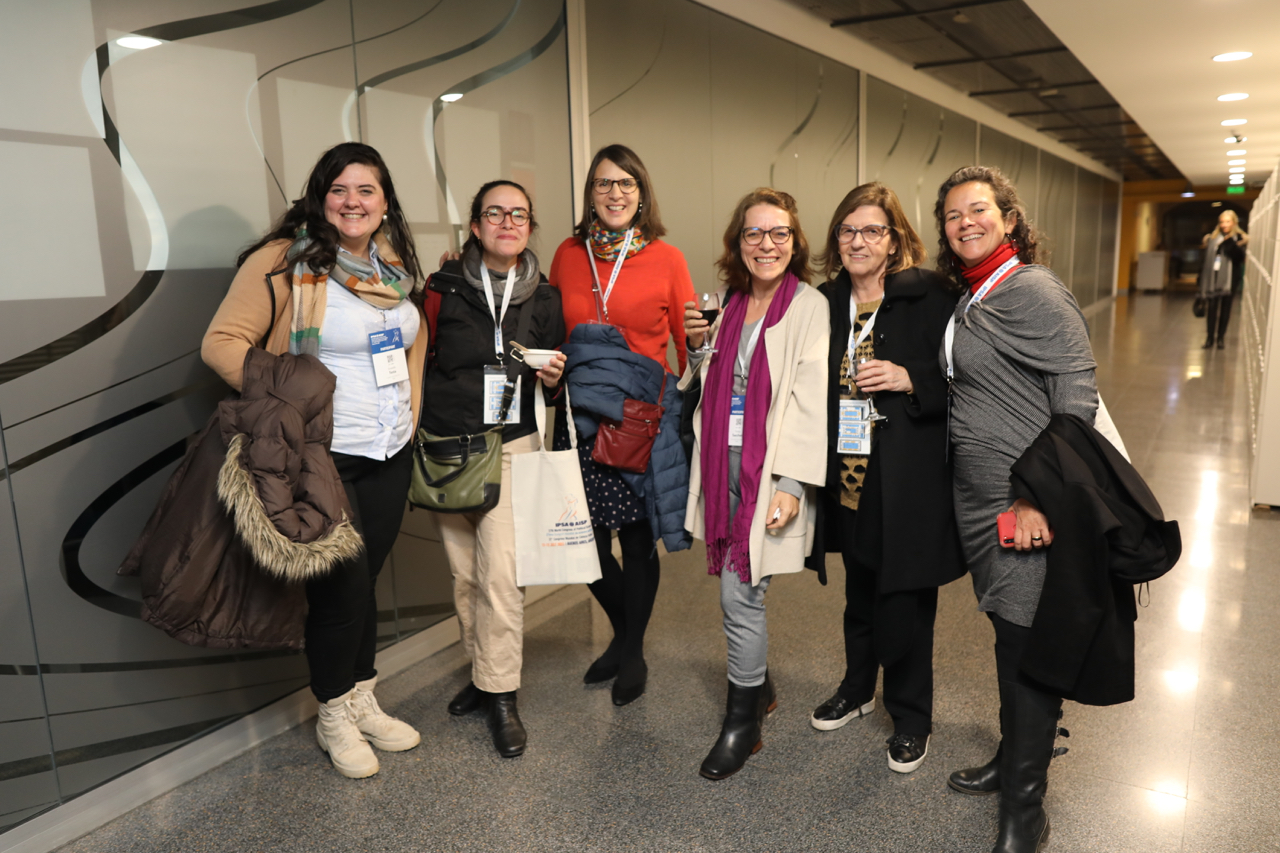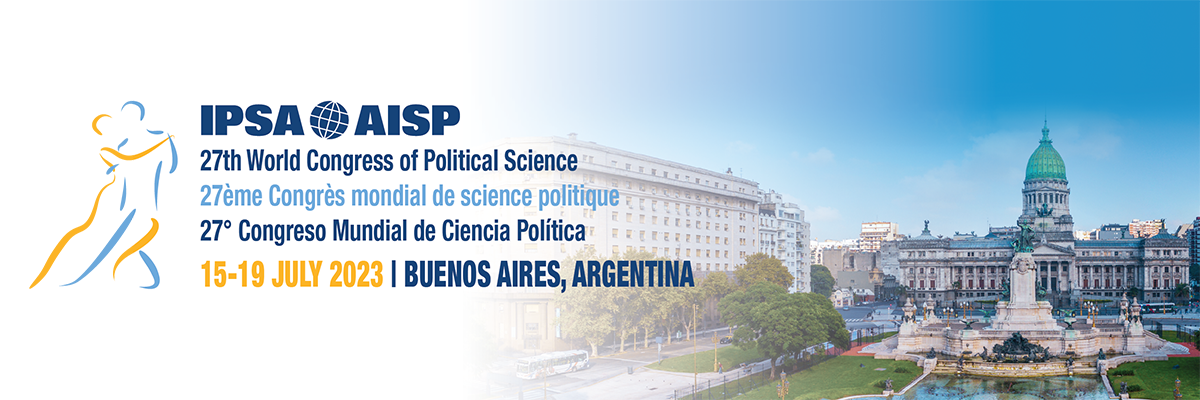

Recap of the 2023 IPSA World Congress - Day 1 (16 July)
Publication date: Sun, 09 Jul 2023
IPSA President’s Plenary: New World A Comin…? The Political and Social Dimensions of Change and Crises Across a World without Boundaries
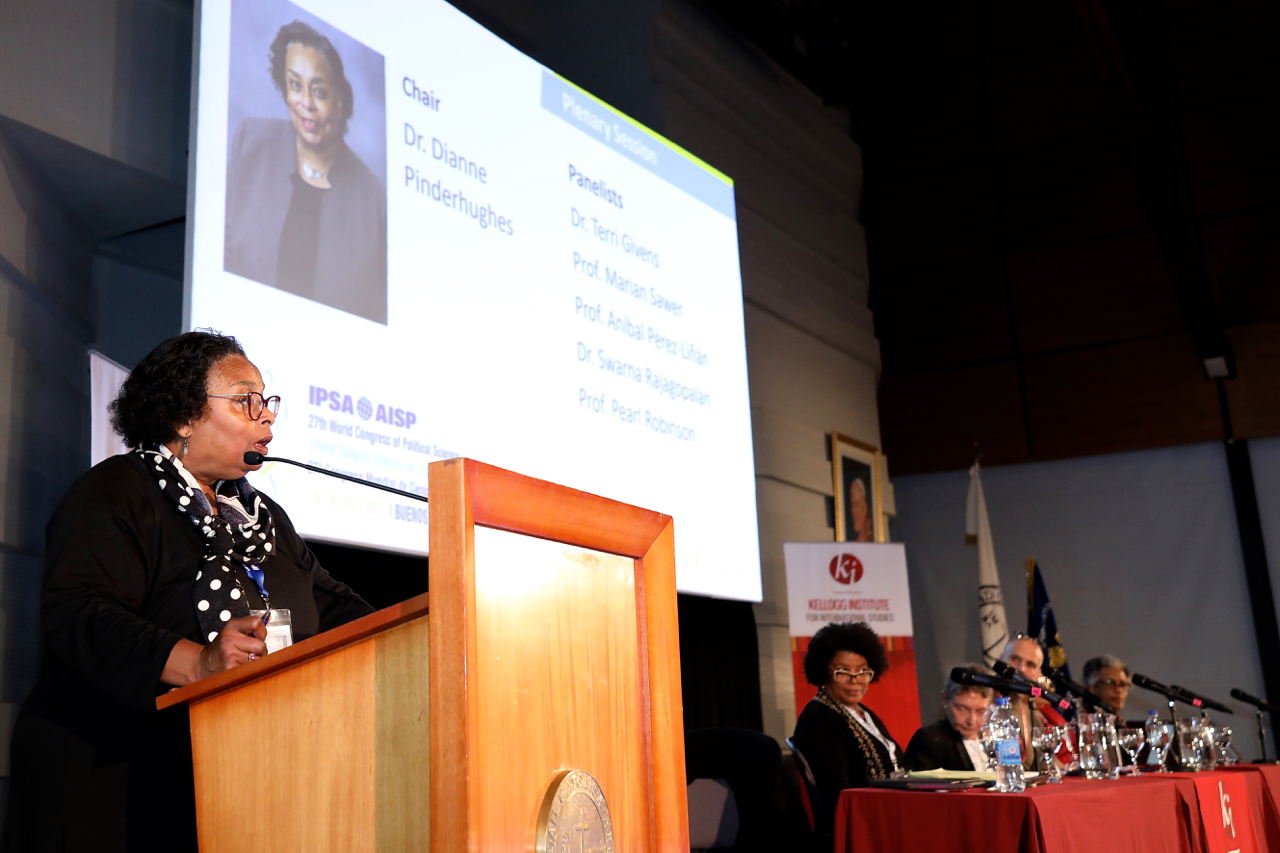 IPSA President Dianne Pinderhughes kicked off the first plenary session of the 2023 IPSA World Congress entitled New World A Comin…? The Political and Social Dimensions of Change and Crises Across a World without Boundaries sponsored by the Kellogg Institute for International Studies, University of Notre Dame. She explained that the vision behind this panel was to have a more comprehensive understanding of transboundary crises thanks to the original and creative research and experiences of the five speakers.
IPSA President Dianne Pinderhughes kicked off the first plenary session of the 2023 IPSA World Congress entitled New World A Comin…? The Political and Social Dimensions of Change and Crises Across a World without Boundaries sponsored by the Kellogg Institute for International Studies, University of Notre Dame. She explained that the vision behind this panel was to have a more comprehensive understanding of transboundary crises thanks to the original and creative research and experiences of the five speakers.
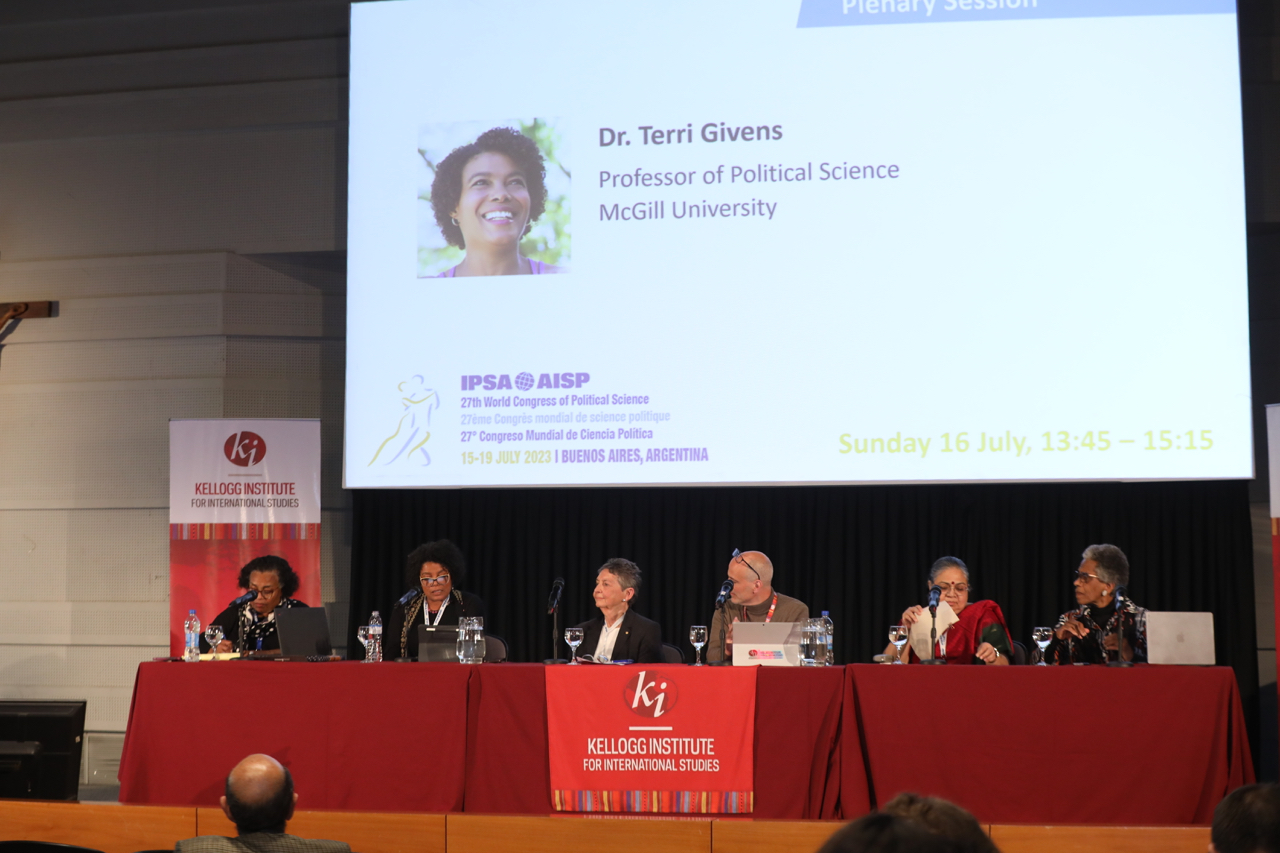 Their extensive academic knowledge on the subject, coupled with their diverse perspectives, helped foster dynamic discussions to deepen our understanding of the nature and challenges of today’s transboundary crises. Spanning the globe, these scholars drew on their own scholarly work and leadership roles to address the contemporary issues facing national and international bodies, such as anti-democratic trends, racism and sexism. The speakers identified democratic backsliding, the rise in radical right-wing politics, and the loss of human rights as some of the causes and symptoms of current transboundary crises.
Their extensive academic knowledge on the subject, coupled with their diverse perspectives, helped foster dynamic discussions to deepen our understanding of the nature and challenges of today’s transboundary crises. Spanning the globe, these scholars drew on their own scholarly work and leadership roles to address the contemporary issues facing national and international bodies, such as anti-democratic trends, racism and sexism. The speakers identified democratic backsliding, the rise in radical right-wing politics, and the loss of human rights as some of the causes and symptoms of current transboundary crises.
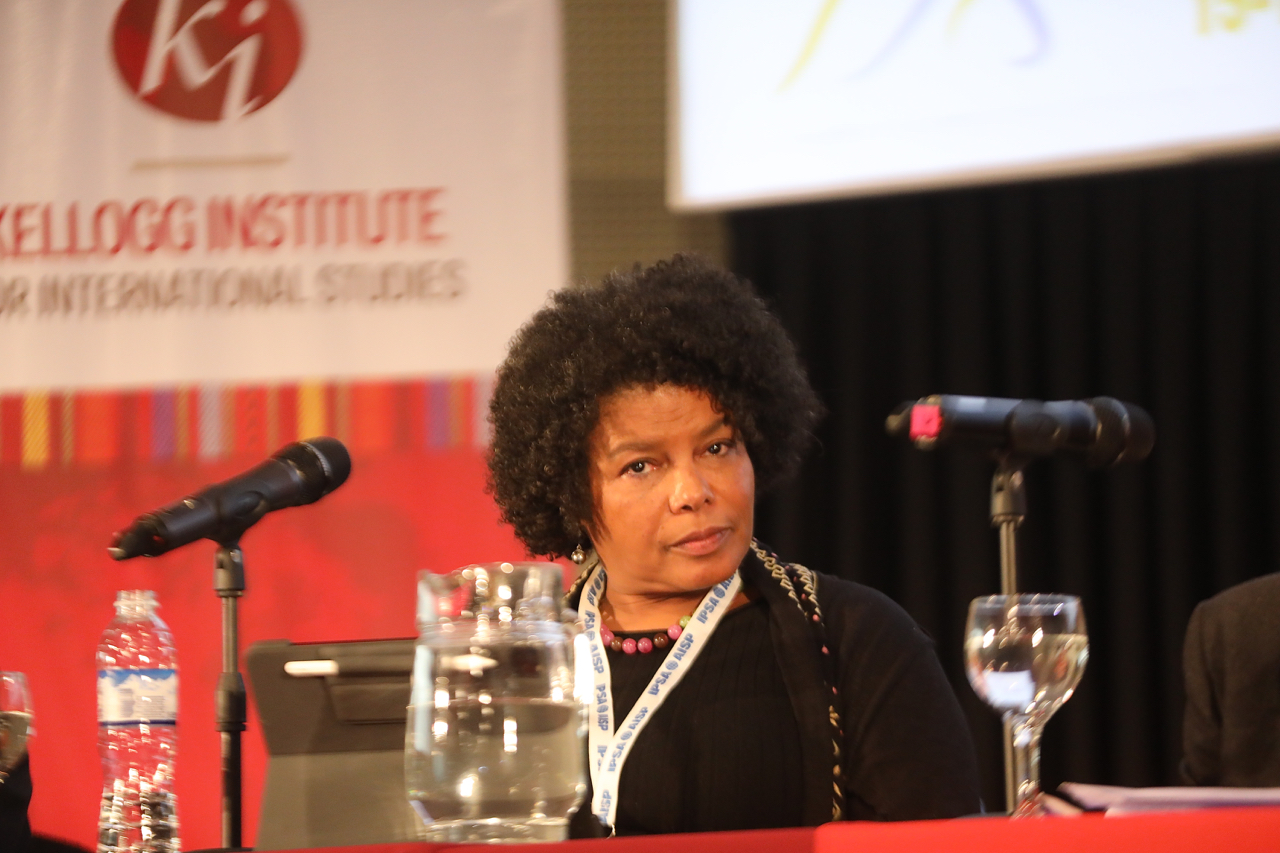 Terri Givens (Professor of Political Science at McGill University), while drawing from her experience studying immigration and race in Europe, emphasized the importance of analyzing these societal developments through a more inclusive lens while amplifying the voices of underrepresented people since there still exists a great institutional inequality and lack of representation. She also emphasized personal responsibility in regards to inequality.
Terri Givens (Professor of Political Science at McGill University), while drawing from her experience studying immigration and race in Europe, emphasized the importance of analyzing these societal developments through a more inclusive lens while amplifying the voices of underrepresented people since there still exists a great institutional inequality and lack of representation. She also emphasized personal responsibility in regards to inequality.
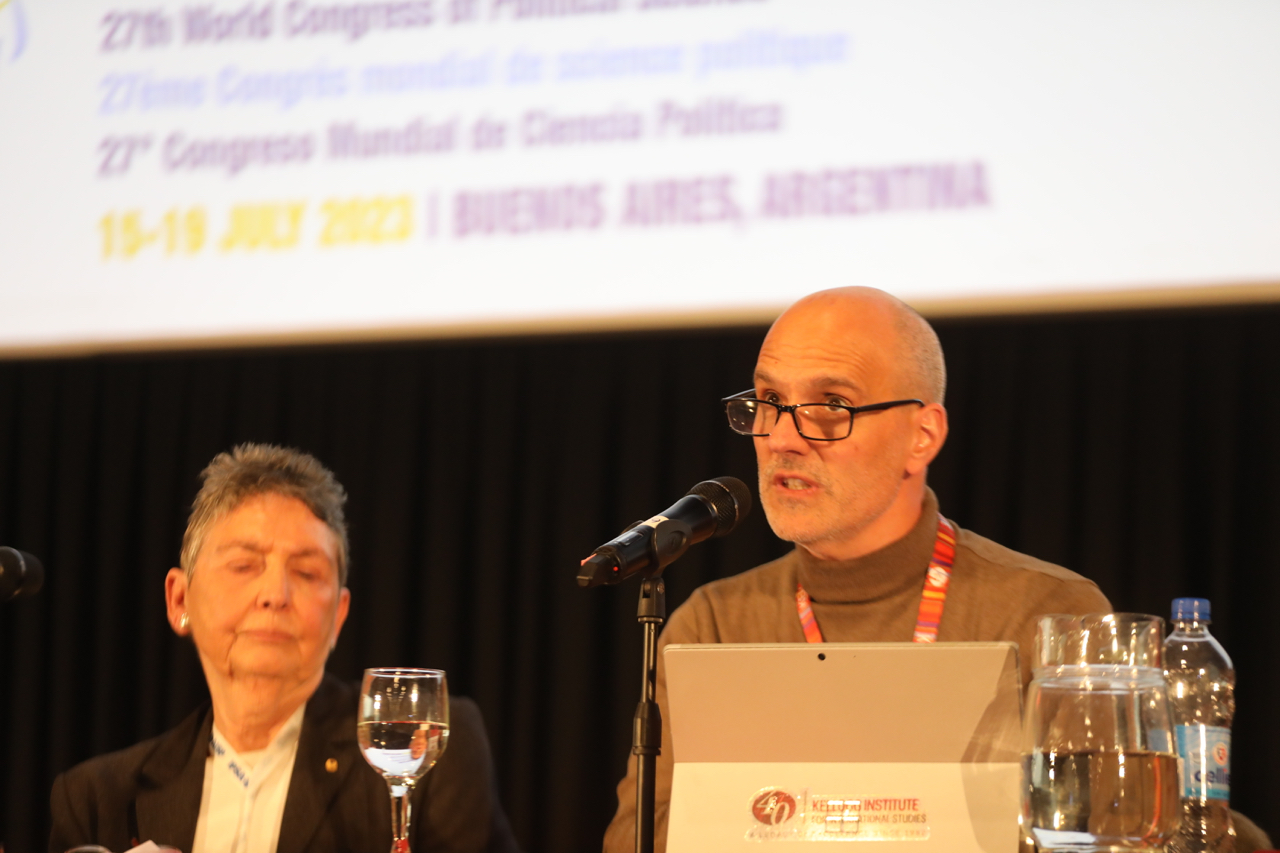 Aníbal Pérez-Liñán (Director of the Kellogg Institute for International Studies) also explained that popular sentiment for authoritarian regimes does not simply vanish after a democratic transition. Using Argentina as an example, he explained that some of today's most popular political parties were involved in Argentina's dictatorial past.
Aníbal Pérez-Liñán (Director of the Kellogg Institute for International Studies) also explained that popular sentiment for authoritarian regimes does not simply vanish after a democratic transition. Using Argentina as an example, he explained that some of today's most popular political parties were involved in Argentina's dictatorial past.
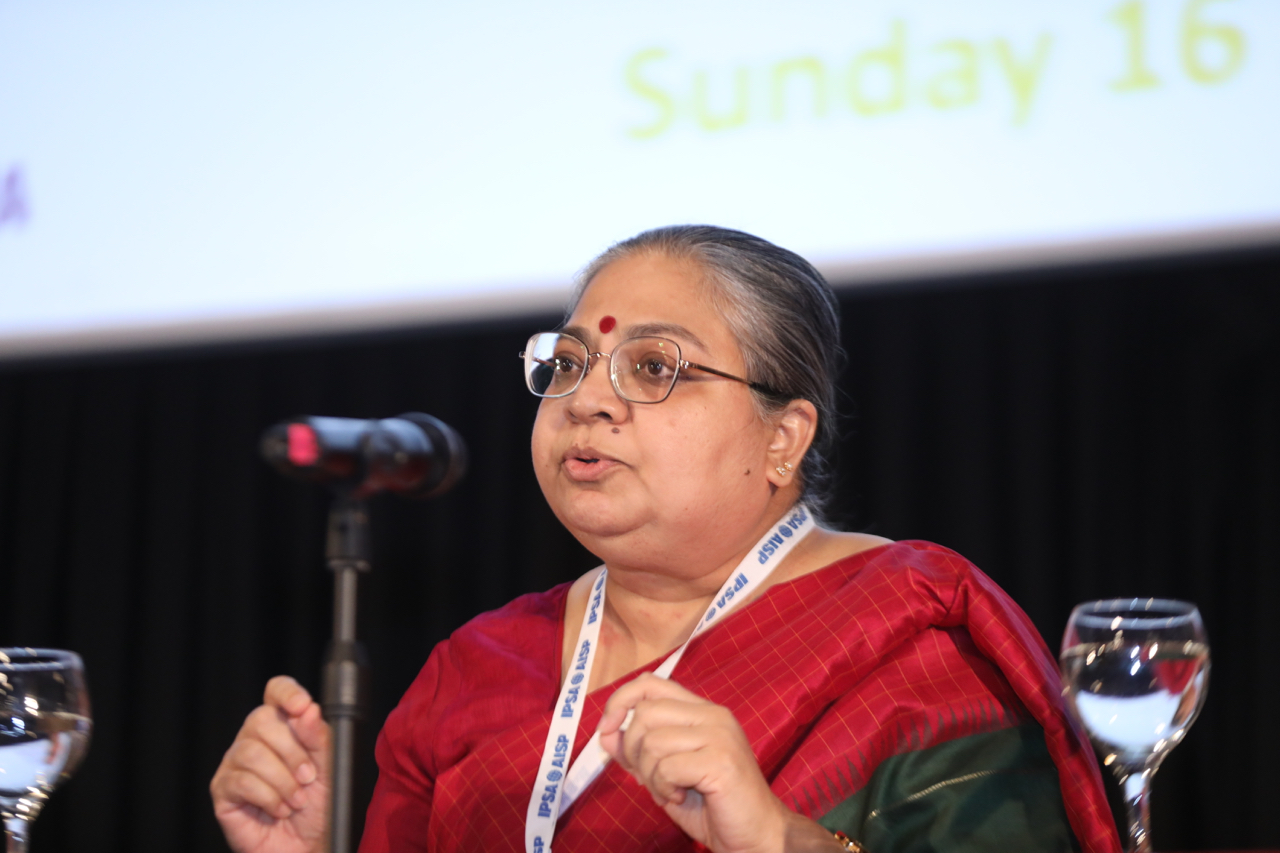 The speakers also explored how COVID-19, a transboundary crisis of its own, has exacerbated current social issues. Swarna Rajagopalan (Scholar of security, peace accords, and women’s issues in Asia) described the rise in domestic violence as a “shadow pandemic” directly correlated with the sanitary crisis amid the increase of other gender-based inequalities and concerns, such as child marriage.
The speakers also explored how COVID-19, a transboundary crisis of its own, has exacerbated current social issues. Swarna Rajagopalan (Scholar of security, peace accords, and women’s issues in Asia) described the rise in domestic violence as a “shadow pandemic” directly correlated with the sanitary crisis amid the increase of other gender-based inequalities and concerns, such as child marriage.
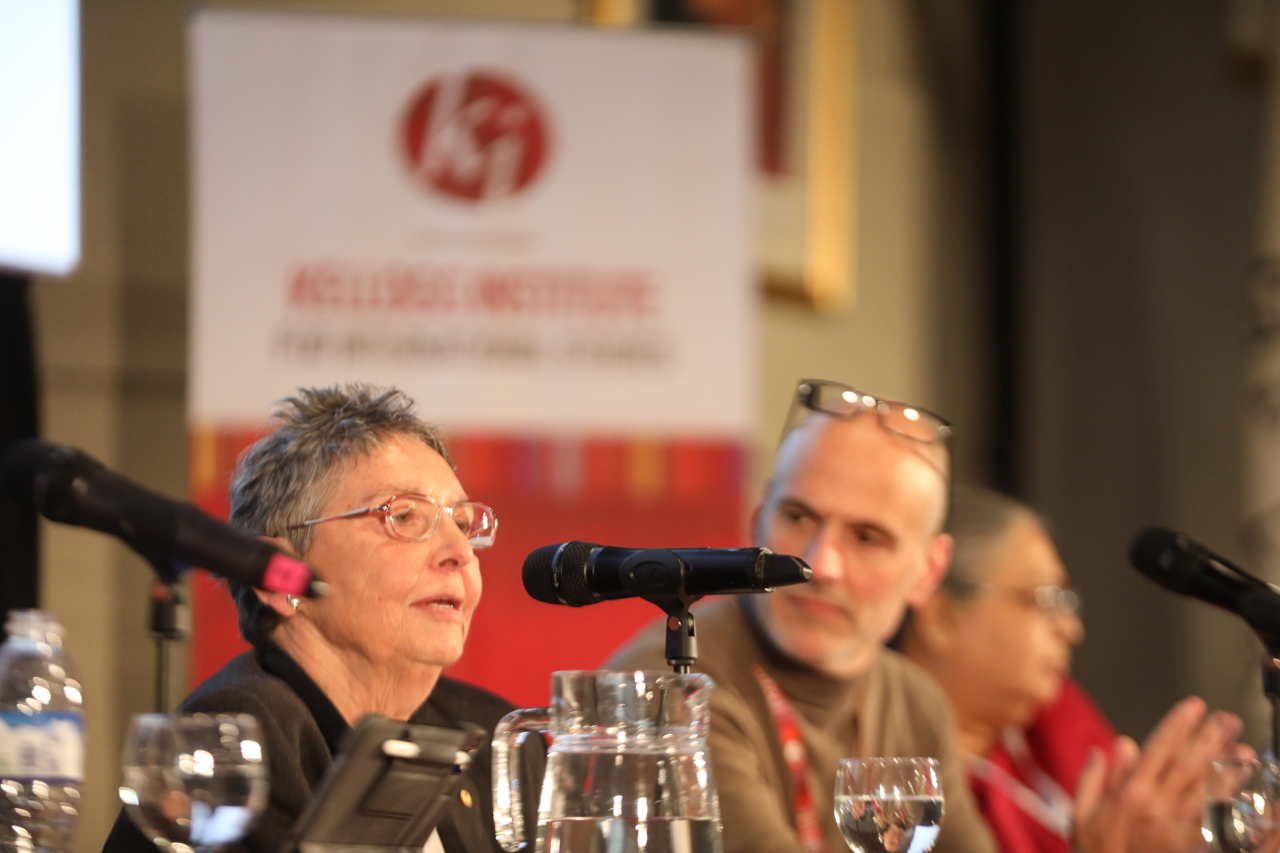 Marian Sawyer (Professor Emeritus at the Australian Centre for Federalism) gave a concise yet thorough overview of political gender struggles over the last few decades. She remarked that although progress has been made, strong counter-movements continue to threaten rights and advancements regarding gender. She continued by using the “Group of Friends of the Family”, a group of 25 countries that wish to enforce traditional family composition, as an example of a modern countermovement and way of confining people to gender roles.
Marian Sawyer (Professor Emeritus at the Australian Centre for Federalism) gave a concise yet thorough overview of political gender struggles over the last few decades. She remarked that although progress has been made, strong counter-movements continue to threaten rights and advancements regarding gender. She continued by using the “Group of Friends of the Family”, a group of 25 countries that wish to enforce traditional family composition, as an example of a modern countermovement and way of confining people to gender roles.
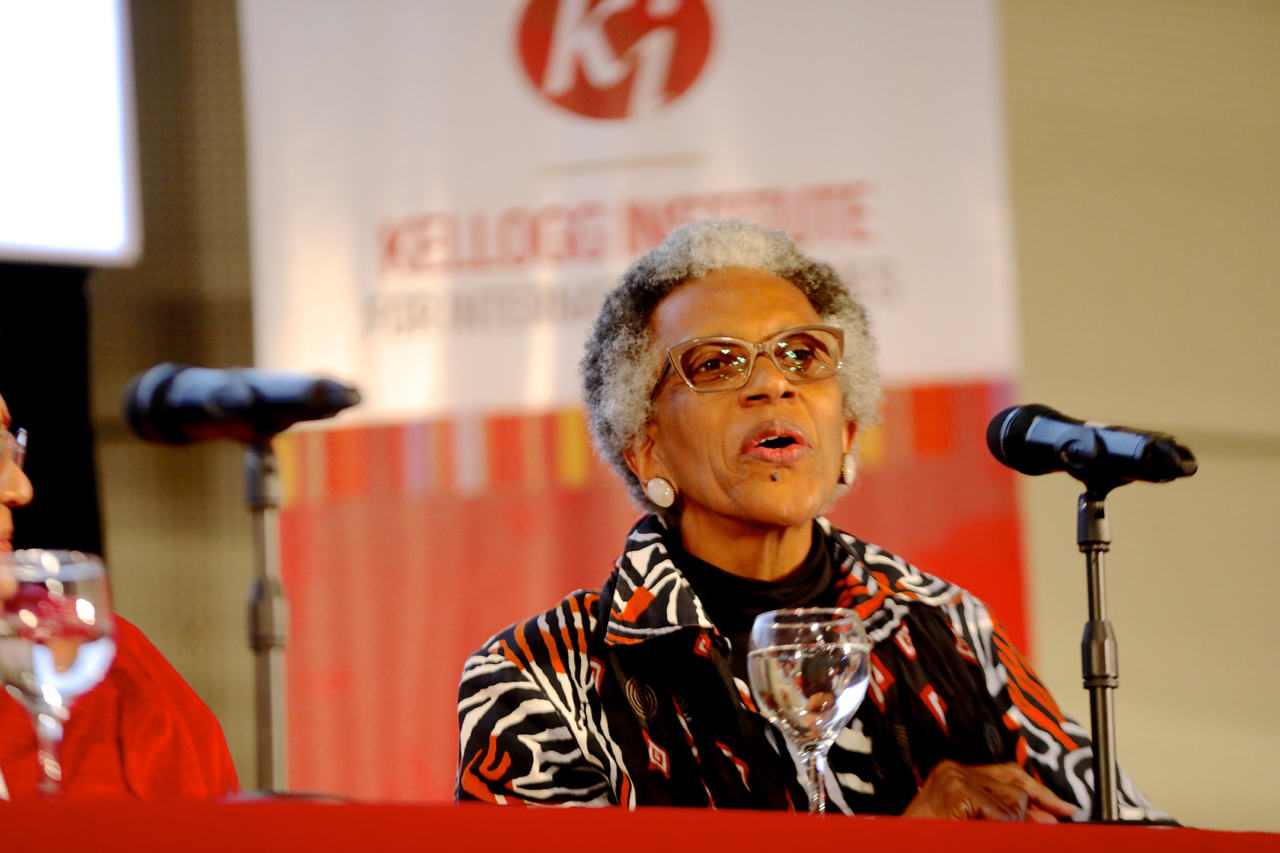 Lastly, Pearl T. Robinson (Professor of Political Science at Tufts University) closed the discussions by emphasizing the importance of not only studying politics academically but of experiencing it as well. She mentioned her valuable field experience and the phenomenon of democratic transition from military to civilian rule by a sovereign national conference in West-African countries previously colonized by the French.
Lastly, Pearl T. Robinson (Professor of Political Science at Tufts University) closed the discussions by emphasizing the importance of not only studying politics academically but of experiencing it as well. She mentioned her valuable field experience and the phenomenon of democratic transition from military to civilian rule by a sovereign national conference in West-African countries previously colonized by the French.
IPSA Regional Dialogue Roundtable
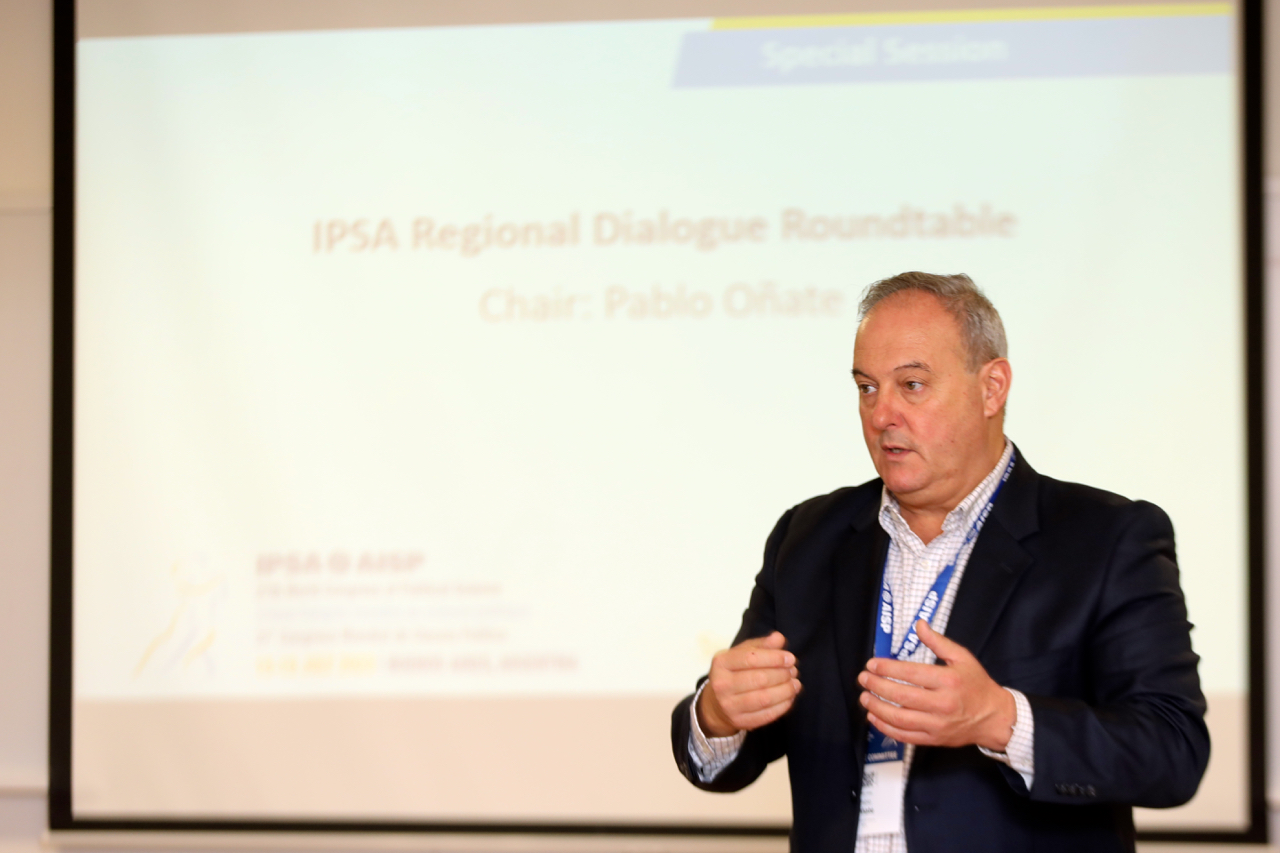 IPSA successfully hosted the second edition of its Regional Dialogues with national and regional political science associations (collective members) at the end of 2022. Throughout the year, five Regional Dialogue meetings were held virtually to foster stronger ties between IPSA and its collective members from Africa, the Americas, Asia-Oceania and Europe. Each meeting was chaired by IPSA Executive Committee members and was attended by IPSA President Dianne Pinderhughes, IPSA President-Elect Pablo Oñate, Executive Director Kim Fontaine-Skronski, Senior Director of Membership, Research and Strategy Mathieu St-Laurent, and representatives of IPSA collective members from these regions. IPSA President-Elect Pablo Oñate opened the discussion of the IPSA Regional Dialogue Roundtable by summarizing the Regional Dialogue initiative and introducing the EC members who chaired the 2022 meetings. In addition to the information relayed by the speakers, a special emphasis was put on how the COVID-19 pandemic affected the collective members.
IPSA successfully hosted the second edition of its Regional Dialogues with national and regional political science associations (collective members) at the end of 2022. Throughout the year, five Regional Dialogue meetings were held virtually to foster stronger ties between IPSA and its collective members from Africa, the Americas, Asia-Oceania and Europe. Each meeting was chaired by IPSA Executive Committee members and was attended by IPSA President Dianne Pinderhughes, IPSA President-Elect Pablo Oñate, Executive Director Kim Fontaine-Skronski, Senior Director of Membership, Research and Strategy Mathieu St-Laurent, and representatives of IPSA collective members from these regions. IPSA President-Elect Pablo Oñate opened the discussion of the IPSA Regional Dialogue Roundtable by summarizing the Regional Dialogue initiative and introducing the EC members who chaired the 2022 meetings. In addition to the information relayed by the speakers, a special emphasis was put on how the COVID-19 pandemic affected the collective members.
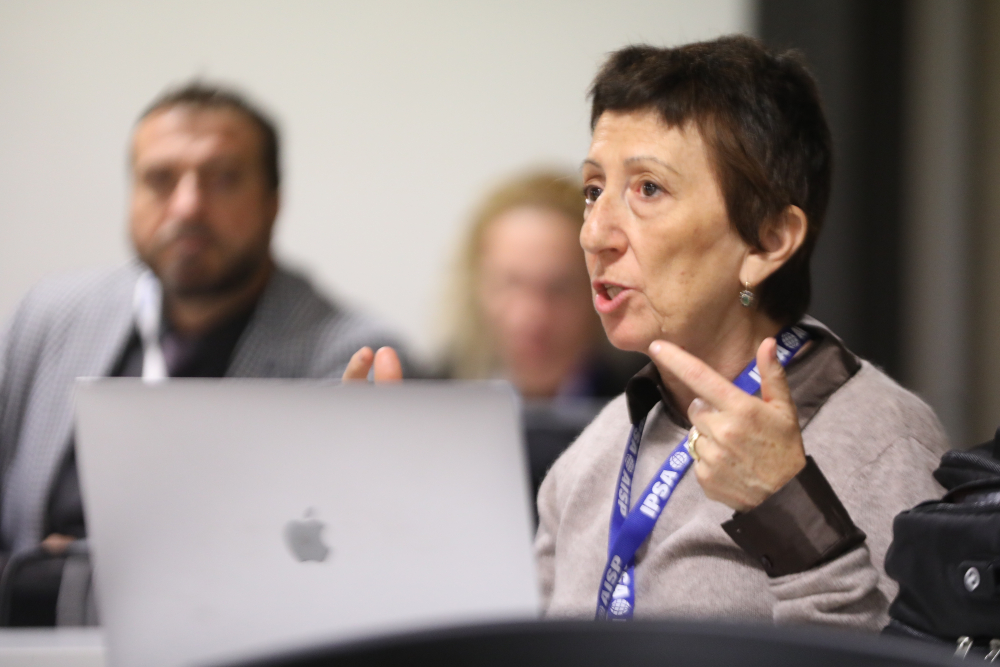 Europe (Presented by Francesca Longo)
Europe (Presented by Francesca Longo)
IPSA Executive Committee members Anja Jetschke and Florence Haegel presented the findings from their meeting with European representatives. They highlighted the use of virtual platforms for meetings and conferences, and the importance of open access publications. They also mentioned high levels of stress and anxiety among students and the new reality for universities. Overall, the discussions emphasized the need to address current challenges and maintain the discipline’s research quality.
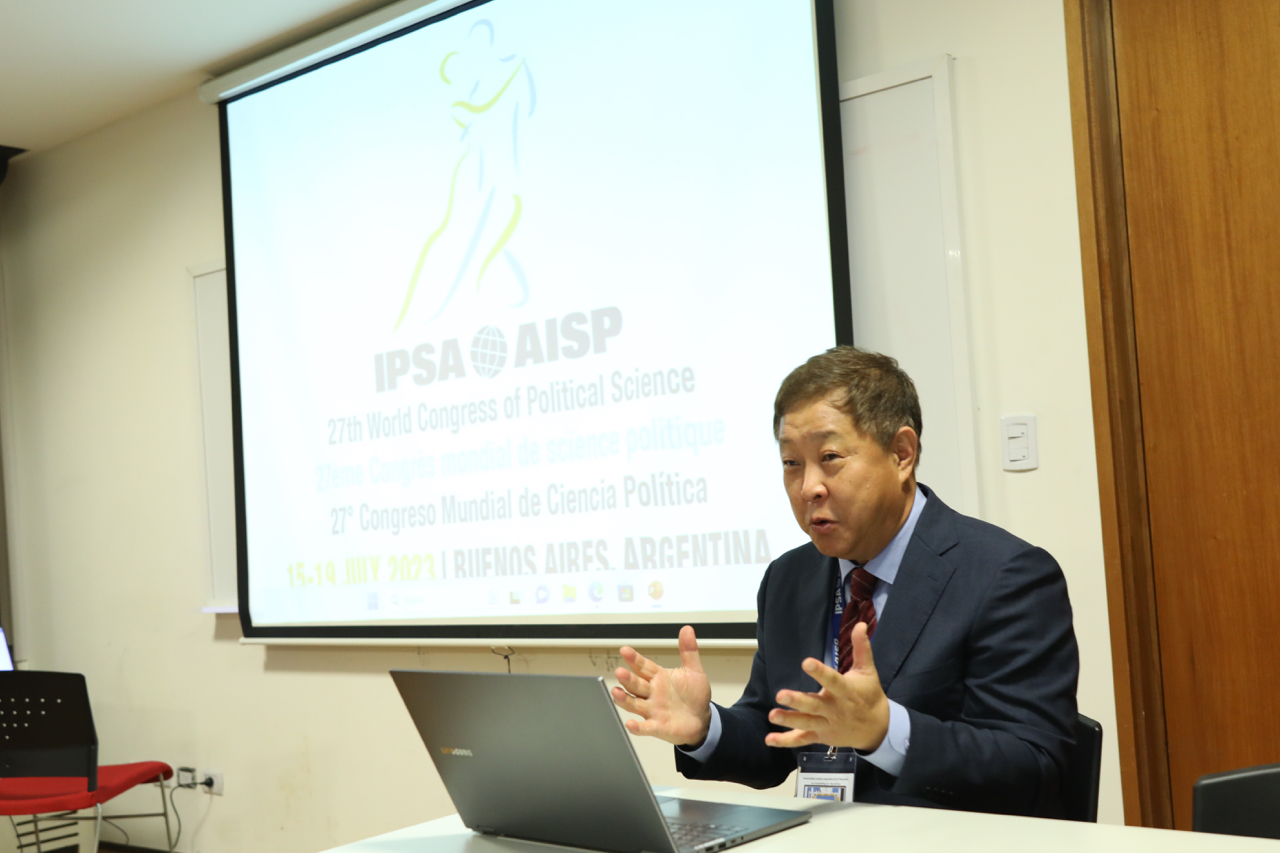 Asia-Oceania (Presented by Euiyoung Kim)
Asia-Oceania (Presented by Euiyoung Kim)
The findings of the Asia-Oceania region were presented by IPSA EC member and WC2023 Program Co-chair Euiyoung Kim. Prof. Kim explained that associations from Asia and Oceania faced several challenges during the pandemic, including a decline in membership, reduced funding for conferences, and restrictions on overseas travel. As a potential solution to the impact of the pandemic, several associations explored the hybrid meeting format, which had its own difficulties. Overall, the discussions highlighted the importance of adaptability, inclusiveness, and collaboration in addressing the impact of the pandemic on political science.
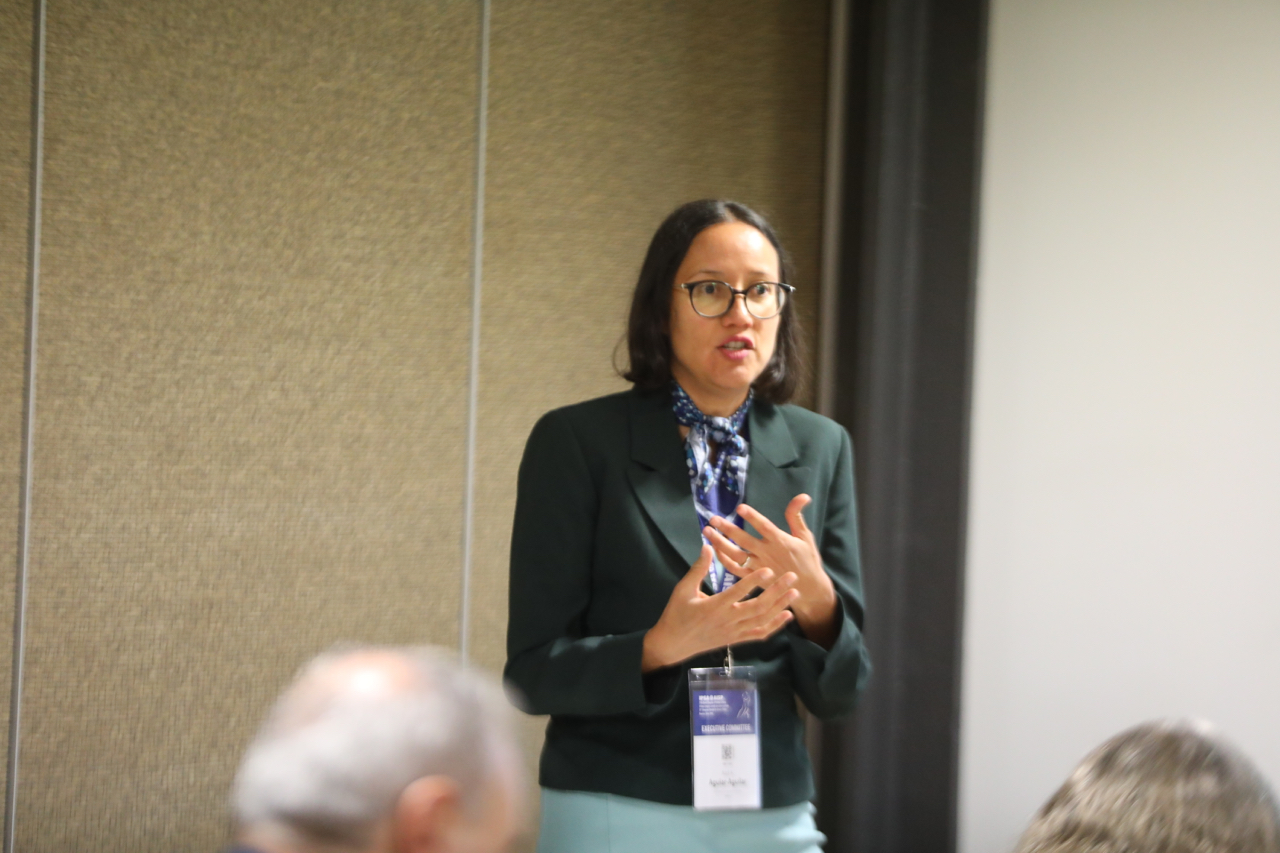 The Americas (Presented by Azul A. Aguiar-Aguilar)
The Americas (Presented by Azul A. Aguiar-Aguilar)
IPSA EC member Azul A. Aguiar-Aguilar pointed out that the pandemic had differing impacts on the Americas. Virtual meetings brought greater regularity, but organizing large virtual events was a challenge. Associations faced declining membership and revenues, while virtual platforms allowed for stronger regional connections.
IPSA Guillermo O’Donnell Award Launch & Lecture and Special Session
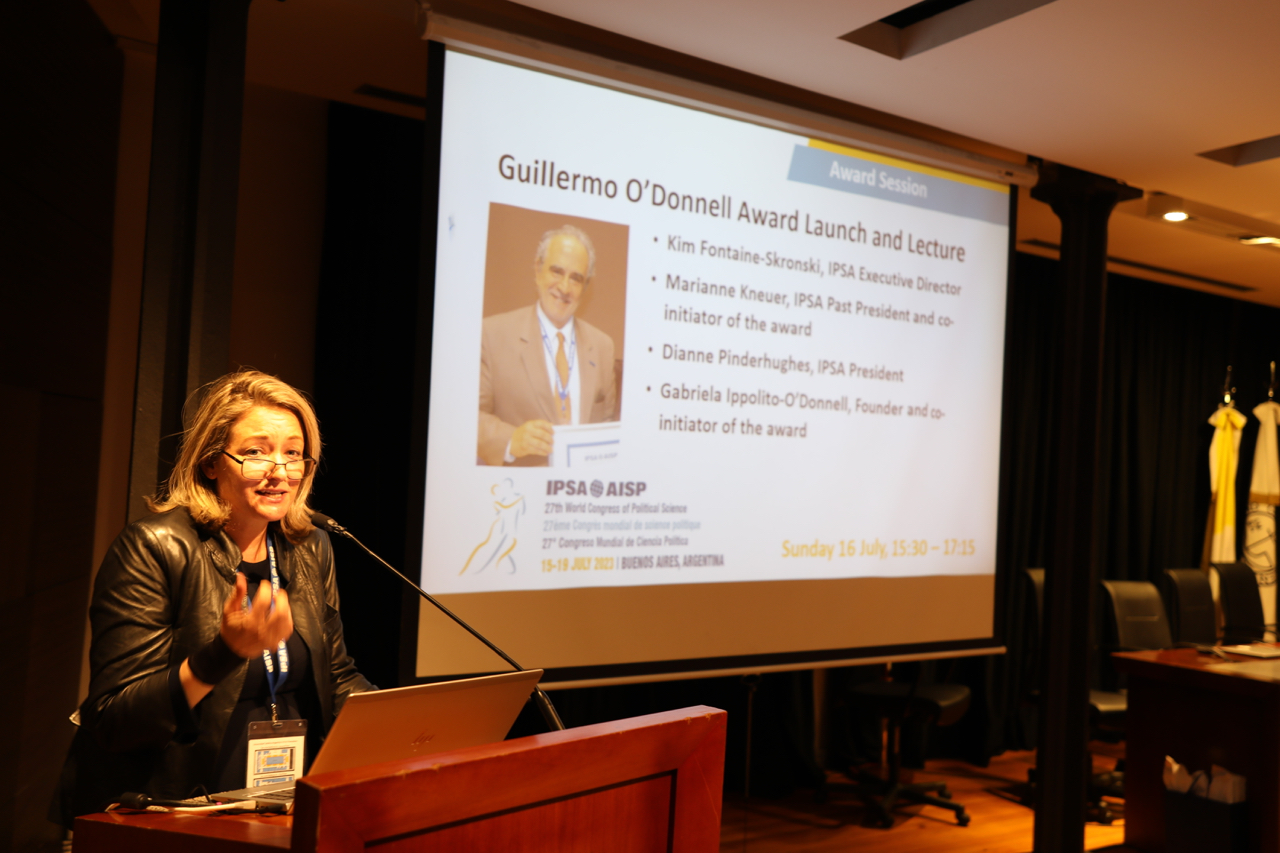
Guillermo O’Donnell’s academic legacy was celebrated in two capacities during the first day of the World Congress: First, through the launching of an award in his honour and second, through a special session that applied his analysis of the unstable nature of democracies to the current state of governance around the world today.
The IPSA Guillermo O’Donnell Award for Latin-American Scholars was launched at the 2023 IPSA World Congress to pay tribute to the remarkable legacy of Guillermo O’Donnell, IPSA’s Past President and one of Latin America’s most prominent political scientists.
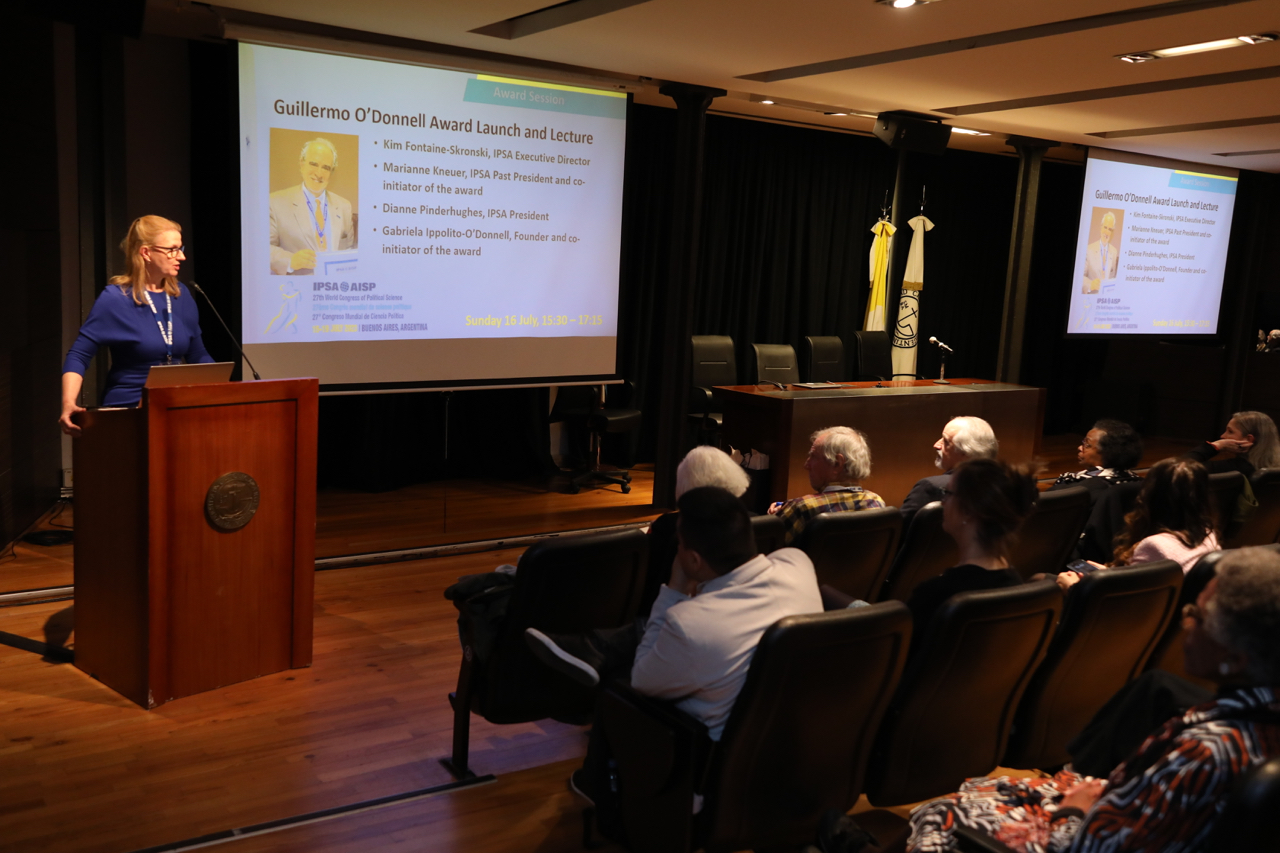 During the event, IPSA Executive Director Kim Fontaine-Skronski welcomed guests and introduced Marianne Kneuer, IPSA Past President and Co-founder of the award, who talked about Guillermo O’Donnell and the objectives of this new award.
During the event, IPSA Executive Director Kim Fontaine-Skronski welcomed guests and introduced Marianne Kneuer, IPSA Past President and Co-founder of the award, who talked about Guillermo O’Donnell and the objectives of this new award.
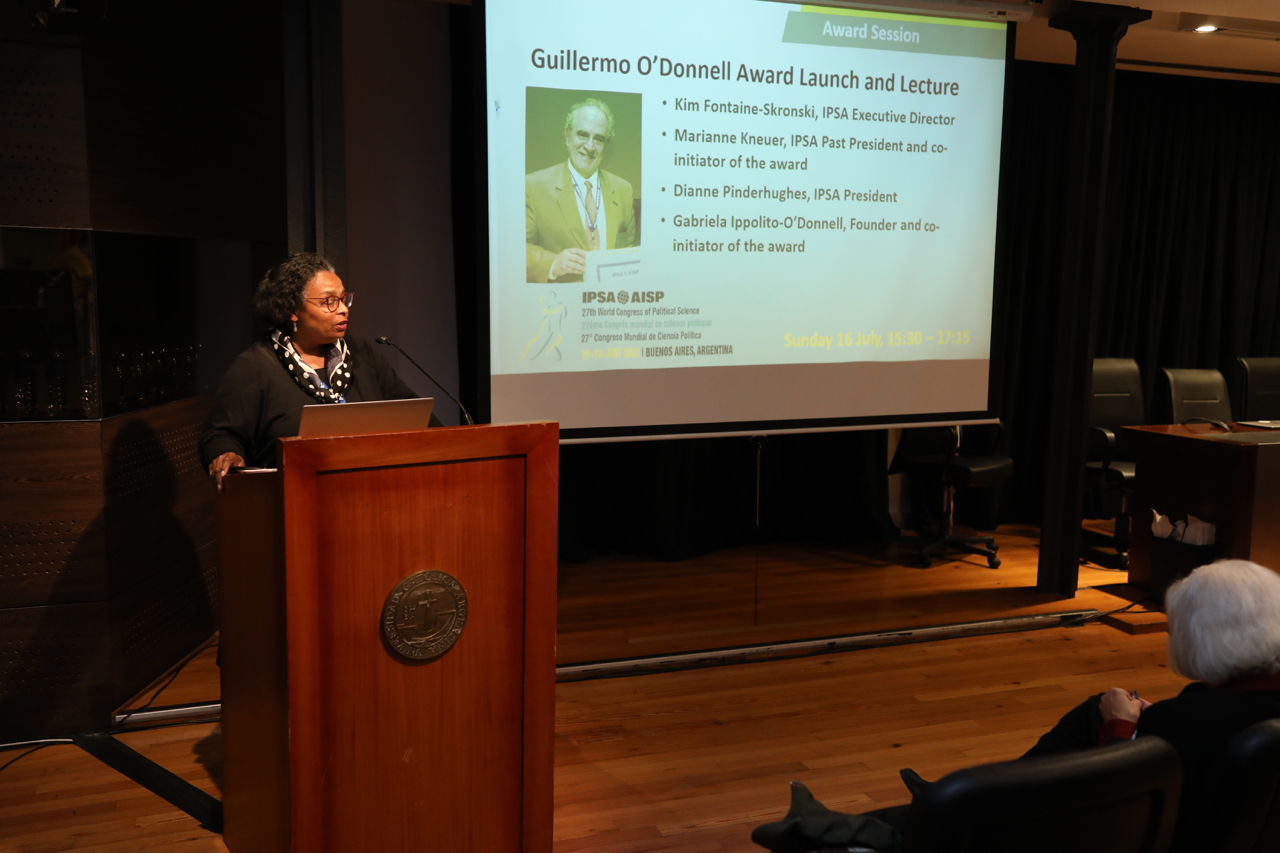 The next speaker was IPSA President Dianne Pinderhughes, who congratulated the organizers and highlighted O’Donnell’s legacy for IPSA and the political science community. Gabriela Ippolito-O’Donnell, Co-founder of the award, then took the stage to thank IPSA for its support in making this award a reality, and to share some personal memories of Guillermo O’Donnell.
The next speaker was IPSA President Dianne Pinderhughes, who congratulated the organizers and highlighted O’Donnell’s legacy for IPSA and the political science community. Gabriela Ippolito-O’Donnell, Co-founder of the award, then took the stage to thank IPSA for its support in making this award a reality, and to share some personal memories of Guillermo O’Donnell.
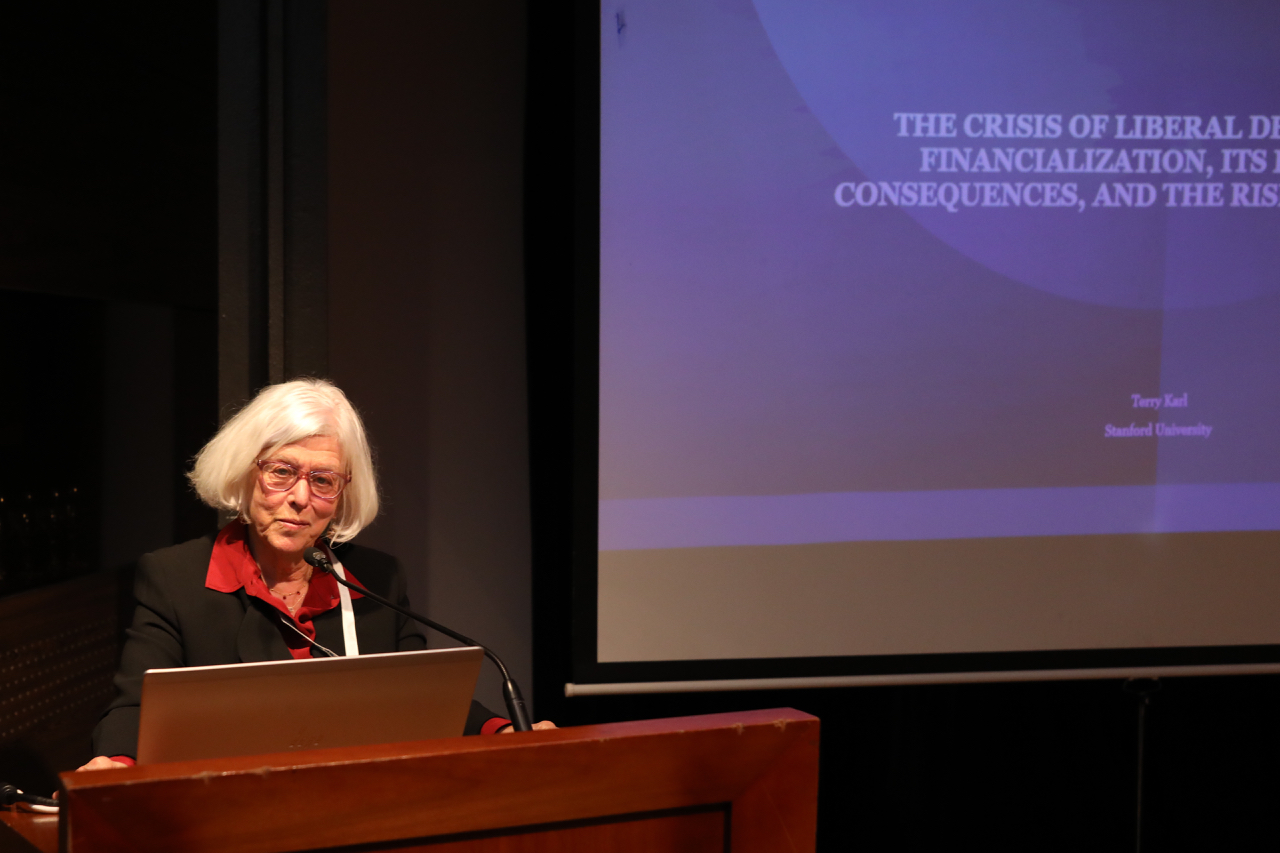 For the occasion, Terry L. Karl, the 2023 Latin American Studies Association (LASA) Guillermo O’Donnell Democracy Award Recipient, delivered a lecture at the event. Terry L. Karl, Professor of Political Science at the Centre on Democracy, Development and the Rule of Law at Stanford University, Freeman Spogli Institute for International Studies, presented the concept of democracy as an inherent contradiction. On the one hand, it has been a vessel for aspiration and freedom. On the other hand, it has also been a constant competition for power, increasing inequalities and the "financialization" of the economy. Moreover, the constant increase in immigration, the creation of mega-identities with fear-based and morally detached personalities and, consequently, the constant devaluation of human life have been some of the main challenges enunciated by academics. The lecture was followed by a lively Q&A session.
For the occasion, Terry L. Karl, the 2023 Latin American Studies Association (LASA) Guillermo O’Donnell Democracy Award Recipient, delivered a lecture at the event. Terry L. Karl, Professor of Political Science at the Centre on Democracy, Development and the Rule of Law at Stanford University, Freeman Spogli Institute for International Studies, presented the concept of democracy as an inherent contradiction. On the one hand, it has been a vessel for aspiration and freedom. On the other hand, it has also been a constant competition for power, increasing inequalities and the "financialization" of the economy. Moreover, the constant increase in immigration, the creation of mega-identities with fear-based and morally detached personalities and, consequently, the constant devaluation of human life have been some of the main challenges enunciated by academics. The lecture was followed by a lively Q&A session.
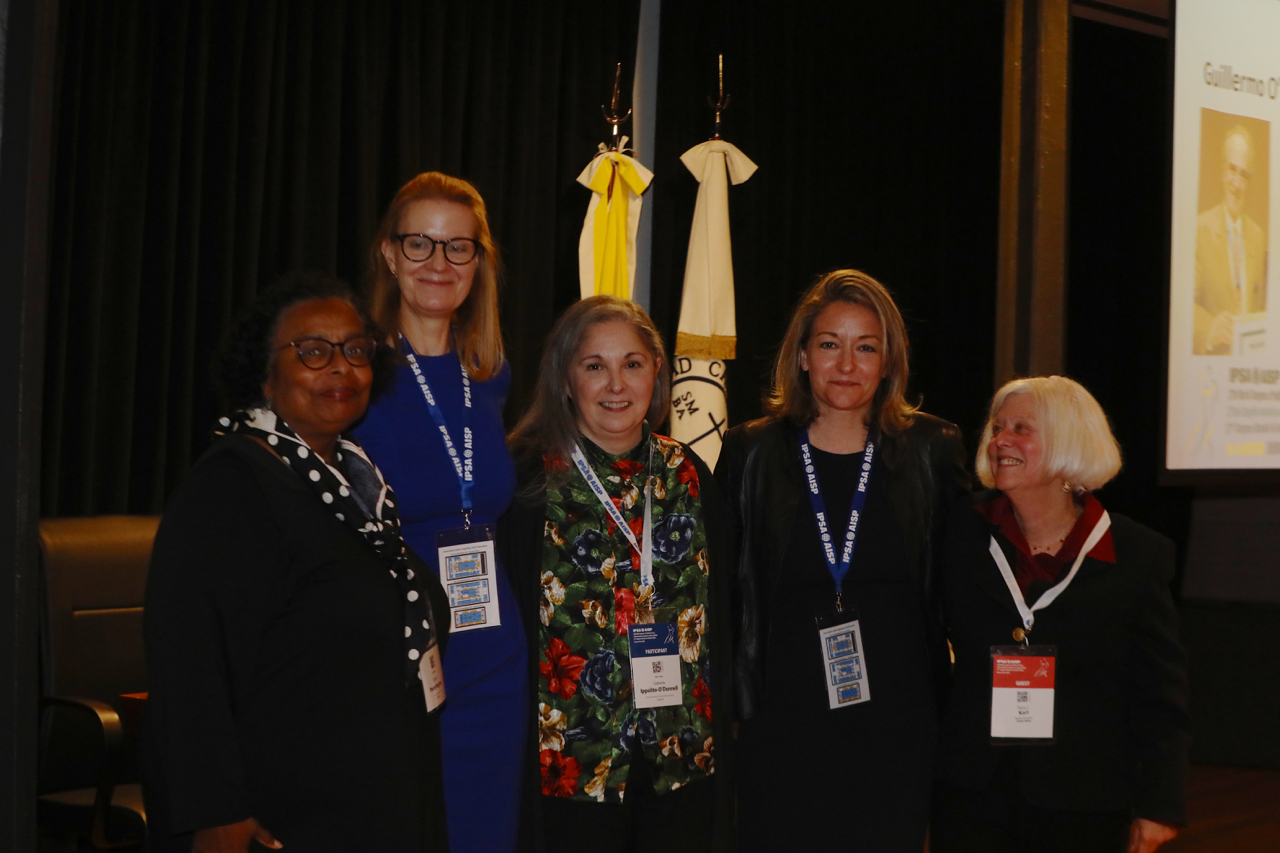 About the Award
About the Award
Thanks to the generous support of its founder, Prof. Gabriela Ippolito-O’Donnell, this new commemorative award will be attributed biennially to a Latin American scholar with residence in the region who has contributed innovative research to the field of political science and has completed their Ph.D. within the last seven years, without any age limit. The award will consist of a monetary prize of $3000 USD and an invitation to give a lecture at the World Congress of Political Science. Given in honor of Prof. Guillermo O’Donnell, a distinguished Argentine political scientist, the prize will be awarded for the first time at the 2025 World Congress of Political Science in Seoul, South Korea.
Photo (left to right): Dianne Pinderhughes, Marianne Kneuer, Gabriela Ippolito-O’Donnell, Kim Fontaine-Skronski and Terry L. Karl.
Special Session: Revisiting O’Donnell in an Era of Democratic Backsliding
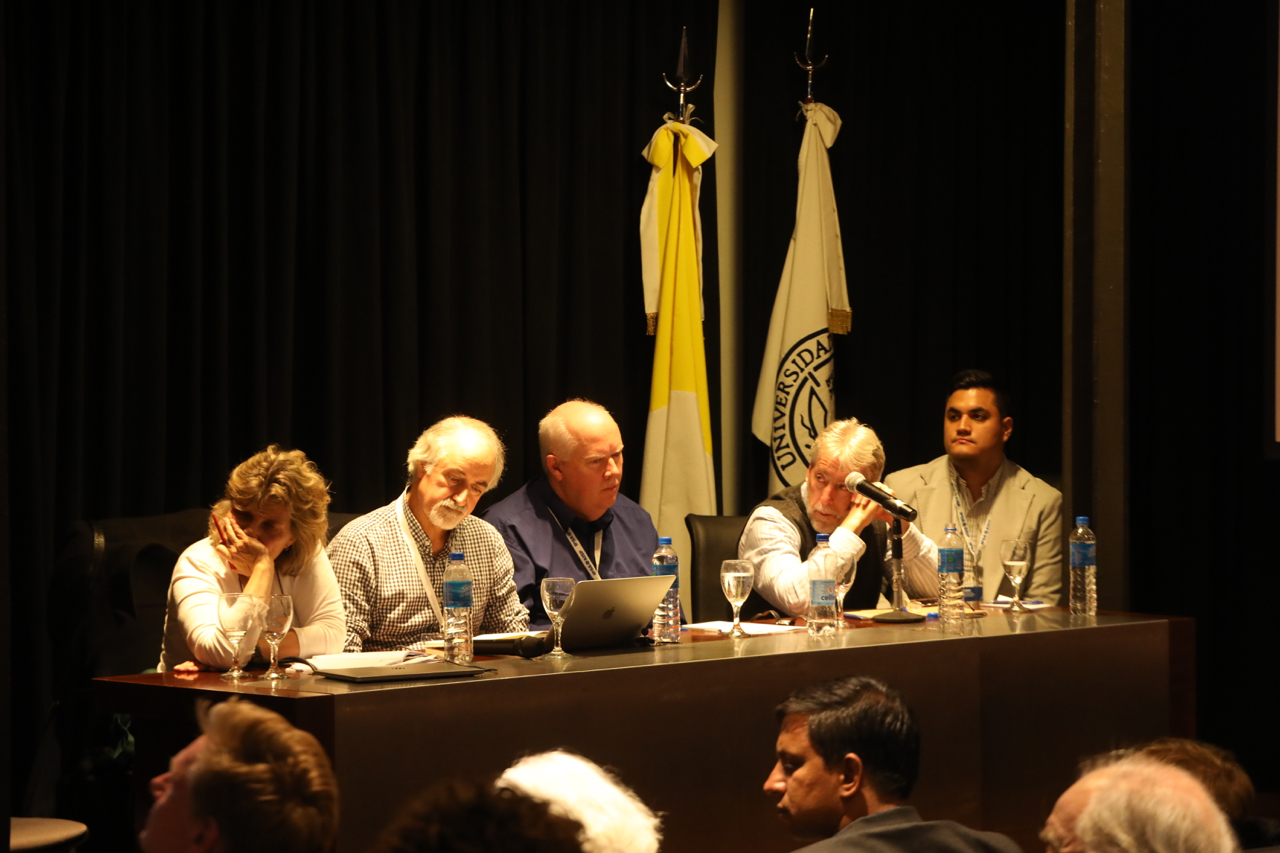 The Special Session Revisiting O’Donnell in an Era of Democratic Backsliding, chaired by Gabriela Ippolito-O’Donnell, brought together eminent scholars who, inspired by Guillermo O'Donnell's research, have also made significant contributions to the field of political science. Panelists included Gabriela Ippolito-O’Donnell (Universidad Nacional de San Martín), Martin Mejía (Tulane University), Catalina Smulovitz (Universidad Torcuato Di Tella), Timothy Power (Oxford University), Susan Stokes (University of Chicago), Maxwell Cameron (University of British Columbia), and Kenneth Roberts (Cornell University).
The Special Session Revisiting O’Donnell in an Era of Democratic Backsliding, chaired by Gabriela Ippolito-O’Donnell, brought together eminent scholars who, inspired by Guillermo O'Donnell's research, have also made significant contributions to the field of political science. Panelists included Gabriela Ippolito-O’Donnell (Universidad Nacional de San Martín), Martin Mejía (Tulane University), Catalina Smulovitz (Universidad Torcuato Di Tella), Timothy Power (Oxford University), Susan Stokes (University of Chicago), Maxwell Cameron (University of British Columbia), and Kenneth Roberts (Cornell University).
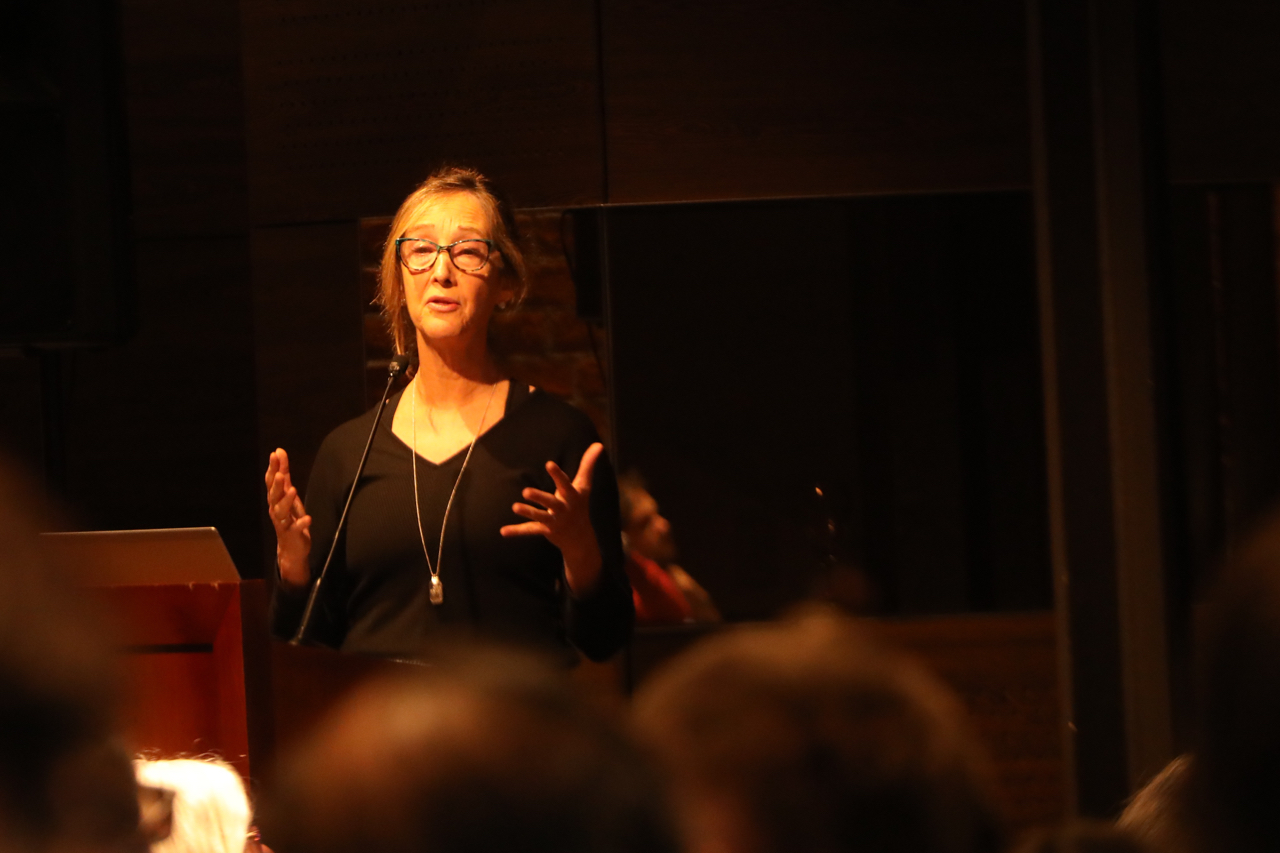 The roundtable’s discussions mainly revolved around the topic of democracy and its volatility. The scholars used O’Donnell’s belief that democracy is in a constant state of crisis as a starting point for lively exchanges on global governance. Susan Strokes analyzed the relationship between income inequality and the risk of democratic erosion, using national data and the examples of Serbia, Brazil and the United States. This event can be reflected in two different paths, with effects on the parts in terms of polarization and generating a public reaction mostly based on institutional nihilism.
The roundtable’s discussions mainly revolved around the topic of democracy and its volatility. The scholars used O’Donnell’s belief that democracy is in a constant state of crisis as a starting point for lively exchanges on global governance. Susan Strokes analyzed the relationship between income inequality and the risk of democratic erosion, using national data and the examples of Serbia, Brazil and the United States. This event can be reflected in two different paths, with effects on the parts in terms of polarization and generating a public reaction mostly based on institutional nihilism.
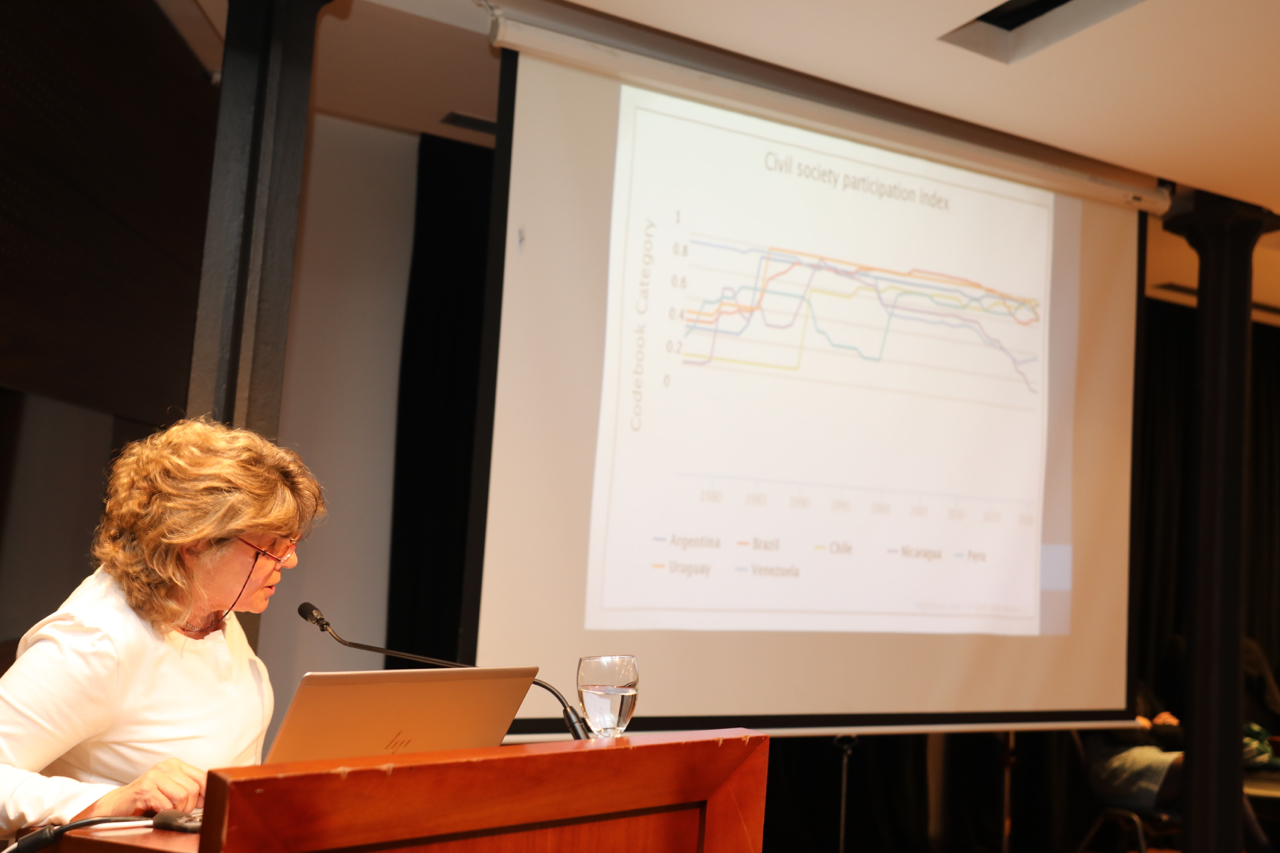 Catalina Smulovitz presented Guillermo O'Donnell's idea based on democracy as an idea of fullness. She raised the question: why are we worried about political polarization when liberal indices show the opposite, understanding that today’s societies do not have the necessary mechanisms to understand the intensity of this problem?
Catalina Smulovitz presented Guillermo O'Donnell's idea based on democracy as an idea of fullness. She raised the question: why are we worried about political polarization when liberal indices show the opposite, understanding that today’s societies do not have the necessary mechanisms to understand the intensity of this problem?
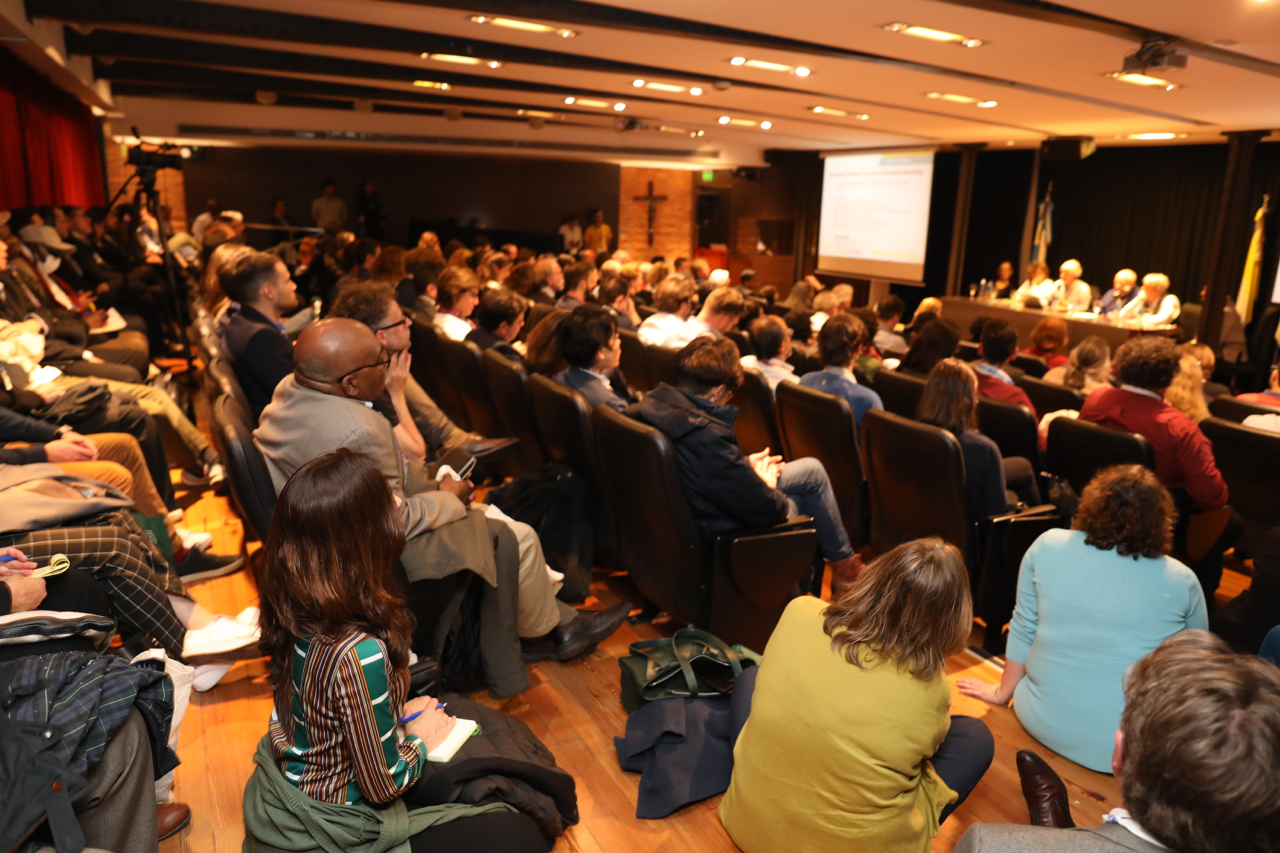 Maxwell Cameron analyzed corruption from a more federal perspective and in relation to encroachment. Presenting the phenomenon of democratic delinquency, he gave examples of the perpetuation of fraud in the name of electoral freedom and the institutionalization of procedures for unproven charges. Timothy Power understood that regime change is not linear. Comparing the authoritarian regimes of Brazil and Argentina, he highlighted the fact that new political leaders have no knowledge of the past in terms of authoritarian regimes, which has a direct impact on democratic institutions. Kenneth Roberts talked about democracy as an open horizon and posed the dilemma of how to pave the way for a more democratic arena.
Maxwell Cameron analyzed corruption from a more federal perspective and in relation to encroachment. Presenting the phenomenon of democratic delinquency, he gave examples of the perpetuation of fraud in the name of electoral freedom and the institutionalization of procedures for unproven charges. Timothy Power understood that regime change is not linear. Comparing the authoritarian regimes of Brazil and Argentina, he highlighted the fact that new political leaders have no knowledge of the past in terms of authoritarian regimes, which has a direct impact on democratic institutions. Kenneth Roberts talked about democracy as an open horizon and posed the dilemma of how to pave the way for a more democratic arena.
Congress Theme Session: Political Violence and Radicalization in the Age of Transboundary Crisis
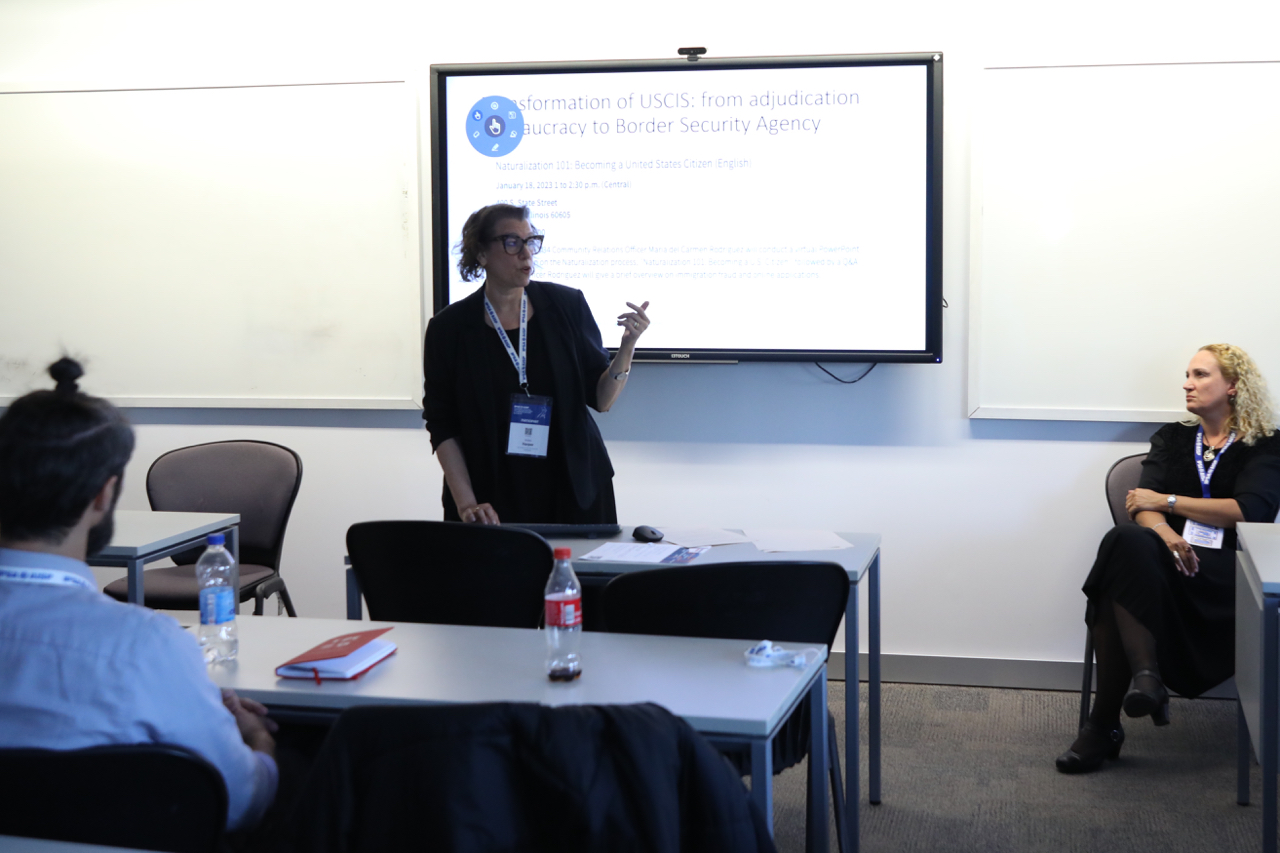
IPSA Vice President Hasret Dikici Bilgin chaired the first theme session of the IPSA World Congress on 16 July. The panel, “Political Violence and Radicalization in the Age of Transboundary Crisis”, brought together renowned scholars to explore critical aspects of radicalization, a topic relevant to current ideological, political and religious extremism trends. Madalena Meyer Resende, a scholar with expertise on comparative relations between religion and state, participated in the panel as a discussant, providing her insights and commentary on the topics presented.
The panel began by situating radicalization within a more extended period of political transformation, drawing on the French case. In their presentation, “Radicalized Democracy”, Stephen Sawyer (Associate Editor of International Political Science Abstracts) and Roman Zinigrad (American University of Paris) argued that an emphasis on response to specific threats and acts of violence prevents us from seeing how radicalization is participating in a broader shift in the political practice of democracy.
The second presentation, “Visual Representation of Refugees: Media Mediation of Radicalization in Competitive Authoritarian Contexts”, examined the relationship between authoritarianism and the mainstreaming of radicalization through visual media in Turkey and Hungary. The authors, Roland Fazekas (Glasgow Caledonian University), Hasret Dikici Bilgin (IPSA Vice-President), and Umut Korkut (IPSA Vice-President), argued that the visual representation of refugees mainstreams radicalization in all countries, but has additional consequences in the authoritarian context by redirecting political discontent away from governments and onto refugees.
Sophia Solomon’s (Ben-Gurion University of the Negev) presentation, “Public Parades as a Mechanism for (De)Radicalization,” examined the role of public parades in the process of radicalization and deradicalization, with a focus on parades in Jerusalem. Finally, in his presentation, “Can States Do Anything? A Critical Examination of Naturalization and Citizen-Making as Tools for Deradicalization,” Robin Harper (York College, City University of New York) examined the role of naturalization and citizenship policies in countering radicalization.
Sponsored Session: How to Face the Challenges of Shrinking Public Space?
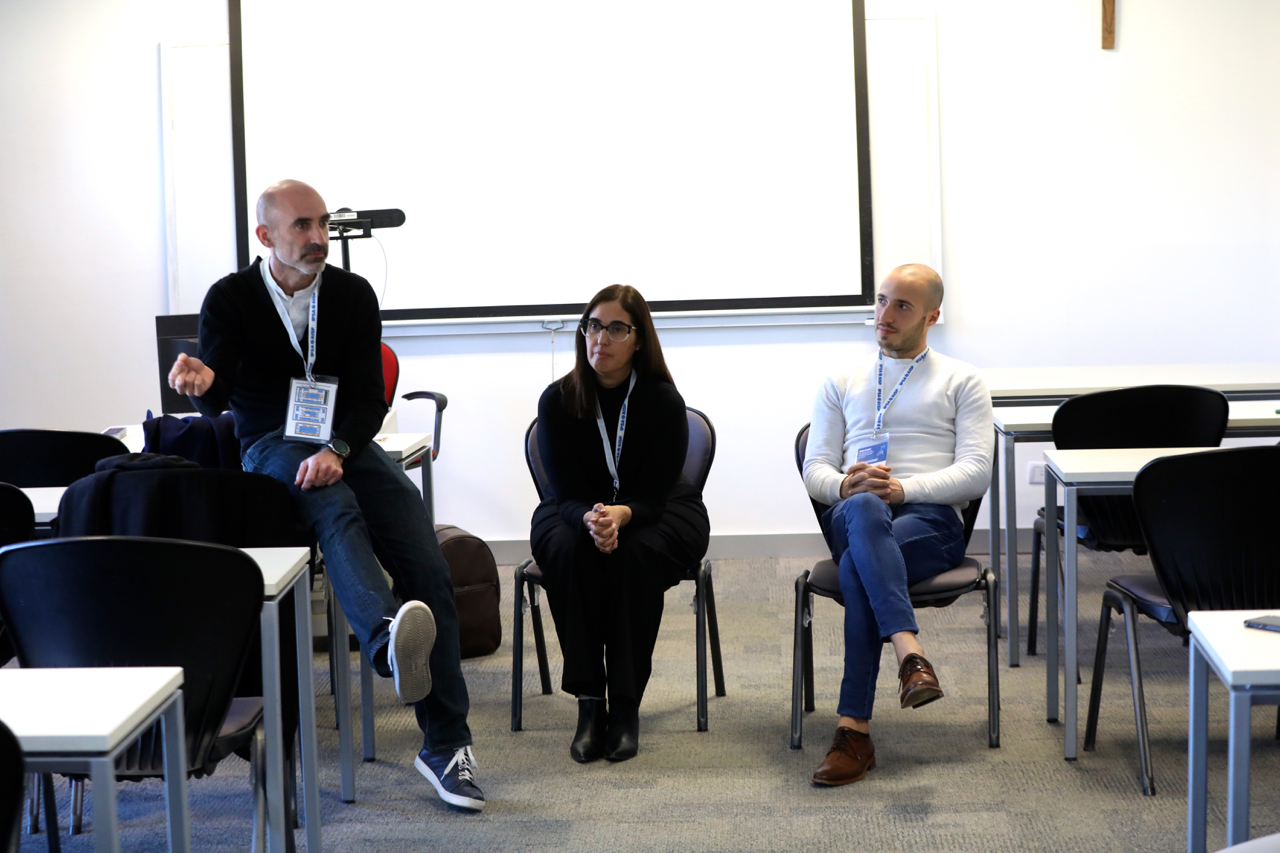 Civic House, an organization that expands the civic and social uses of technology in Latin America, held an insightful session on addressing the challenges posed by a shrinking public space. Presenters Gastón Wright, Cecilia Galvan, Maricel Lonati, and Marco Di Natale engaged participants in a thought-provoking discussion on the relationship between a shrinking civic space and the government’s interest in adopting comprehensive data protection laws. Civil society organizations in Latin America often face several challenges, including limited access to funding, political instability, corruption, social inequality, and restricted freedom of expression. These challenges can significantly affect their operational effectiveness and hinder their ability to achieve meaningful social impact. During the session, participants were encouraged to actively participate and share their perspectives and insights on how civil society organizations can overcome these challenges and ensure their voices are heard in an increasingly constrained environment.
Civic House, an organization that expands the civic and social uses of technology in Latin America, held an insightful session on addressing the challenges posed by a shrinking public space. Presenters Gastón Wright, Cecilia Galvan, Maricel Lonati, and Marco Di Natale engaged participants in a thought-provoking discussion on the relationship between a shrinking civic space and the government’s interest in adopting comprehensive data protection laws. Civil society organizations in Latin America often face several challenges, including limited access to funding, political instability, corruption, social inequality, and restricted freedom of expression. These challenges can significantly affect their operational effectiveness and hinder their ability to achieve meaningful social impact. During the session, participants were encouraged to actively participate and share their perspectives and insights on how civil society organizations can overcome these challenges and ensure their voices are heard in an increasingly constrained environment.
Tech Zone Presentation: A Quick Introduction to QDA Miner and WordStat Text Analysis Software
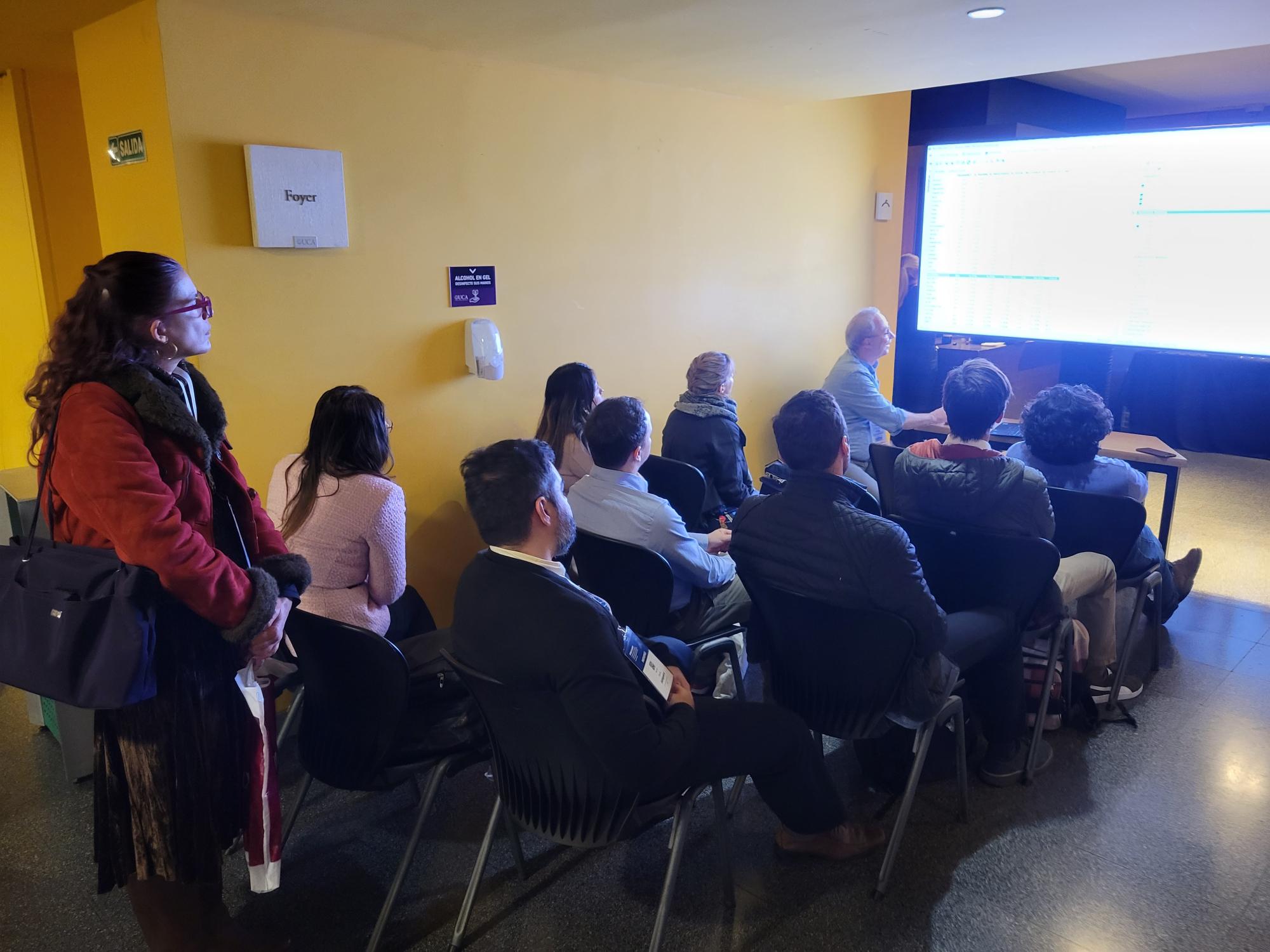 Attendees at the 2023 IPSA World Congress had the opportunity to participate in an informative presentation on the QDA Miner and WordStat text analysis software organized by Provalis Research. Provalis Research is a software company that specializes in the development of qualitative data analysis software and services over 6,000 institutions worldwide. During this Tech Zone session, founder and president of Provalis Research, Normand Peladeau, provided a comprehensive overview of two of their powerful software tools: QDA Miner, a qualitative data analysis and mixed methods tool, and WordStat, a quantitative content analysis and text mining software. The session concluded with an interactive Q&A segment, allowing participants to engage directly with Mr. Peladeau.
Attendees at the 2023 IPSA World Congress had the opportunity to participate in an informative presentation on the QDA Miner and WordStat text analysis software organized by Provalis Research. Provalis Research is a software company that specializes in the development of qualitative data analysis software and services over 6,000 institutions worldwide. During this Tech Zone session, founder and president of Provalis Research, Normand Peladeau, provided a comprehensive overview of two of their powerful software tools: QDA Miner, a qualitative data analysis and mixed methods tool, and WordStat, a quantitative content analysis and text mining software. The session concluded with an interactive Q&A segment, allowing participants to engage directly with Mr. Peladeau.
IPSA Supports Global South Participation with Travel Grants
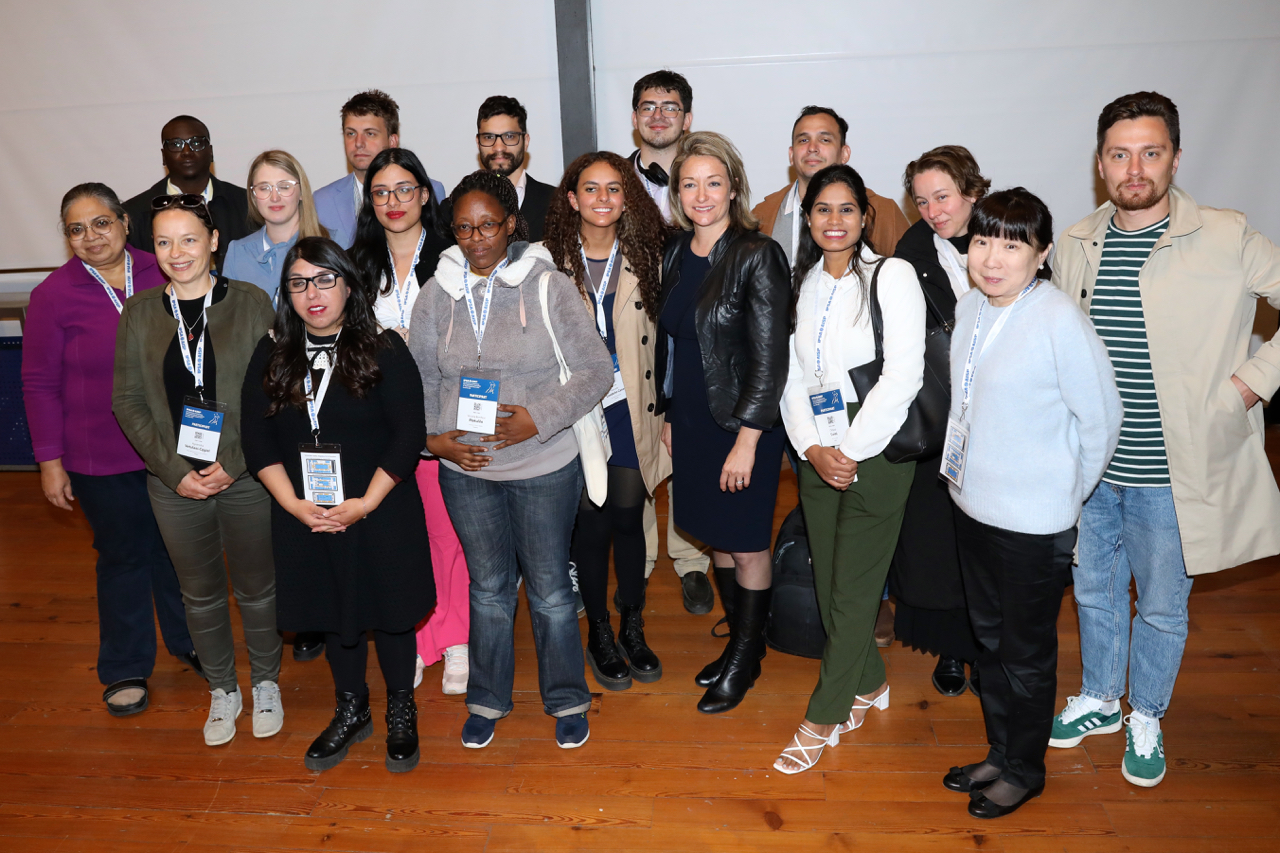 The IPSA World Congress of Political Science is a unique opportunity for scholars from different regions and backgrounds to exchange their research and ideas. To ensure diverse and inclusive participation, IPSA provides travel grants to assist scholars who live and work in developing countries with the cost of attending this global event. Thirty-two scholars from 26 countries met with IPSA Executive Director Kim Fontaine-Skronski to receive their travel grants. We congratulate the recipients of the IPSA Travel Grants and hope they had a fruitful and enjoyable experience at the IPSA World Congress in Buenos Aires.
The IPSA World Congress of Political Science is a unique opportunity for scholars from different regions and backgrounds to exchange their research and ideas. To ensure diverse and inclusive participation, IPSA provides travel grants to assist scholars who live and work in developing countries with the cost of attending this global event. Thirty-two scholars from 26 countries met with IPSA Executive Director Kim Fontaine-Skronski to receive their travel grants. We congratulate the recipients of the IPSA Travel Grants and hope they had a fruitful and enjoyable experience at the IPSA World Congress in Buenos Aires.
Research Method Courses
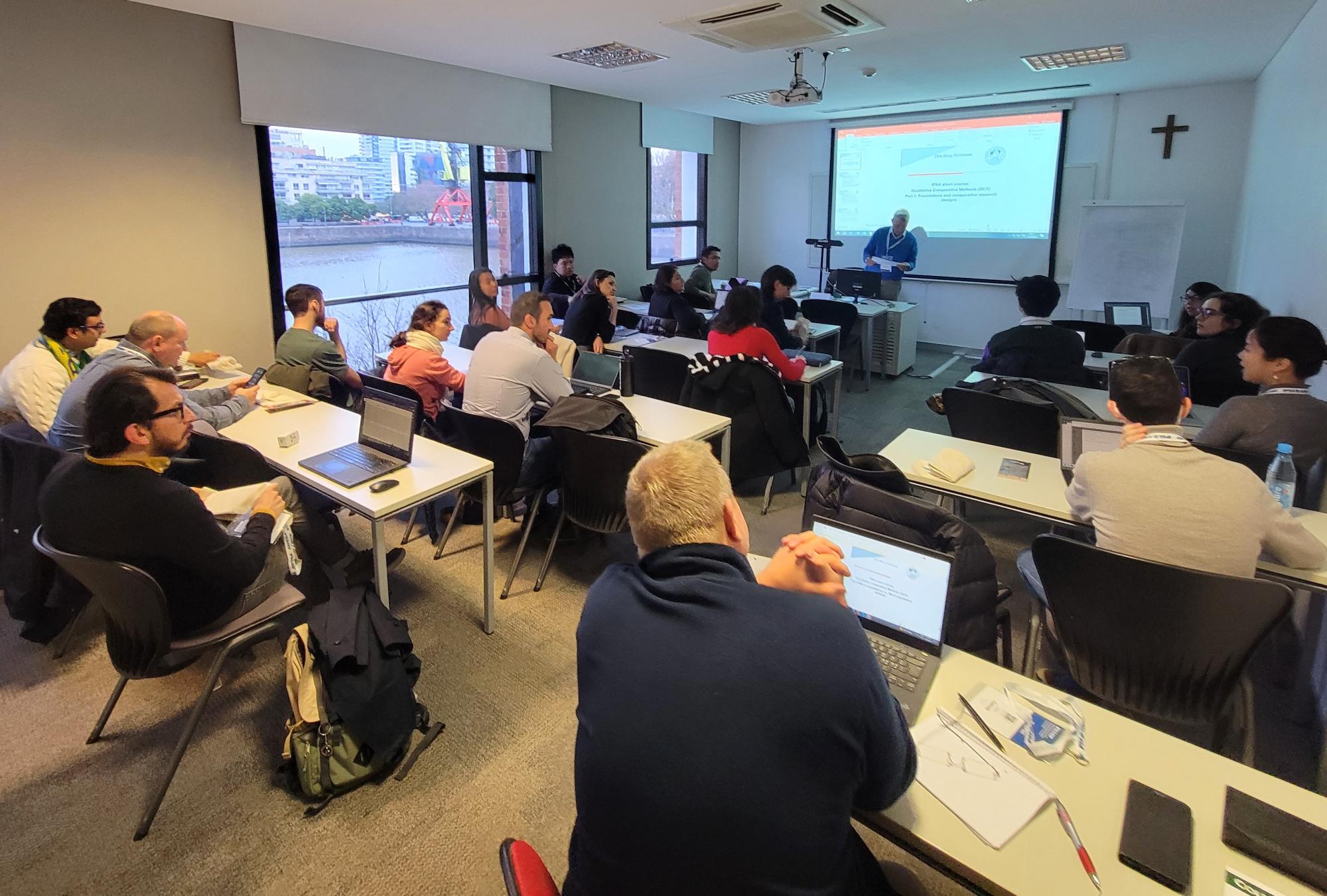 The Research Methods Courses are a long-standing tradition at the IPSA World Congress. These courses, taught by renowned international instructors, provide state-of-the-art information on recent advances in research methods across various fields.
The Research Methods Courses are a long-standing tradition at the IPSA World Congress. These courses, taught by renowned international instructors, provide state-of-the-art information on recent advances in research methods across various fields.
IPSA offered three courses at the 2023 IPSA World Congress on 15 July. The first course, Qualitative Comparative Analysis (QCA), was taught in person by Dirk Berg-Schlosser, Professor Emeritus at the University of Marburg. The course provided a brief introduction to the main variants of the QCA method: crisp-set QCA, multi-value QCA, and fuzzy-set QCA. The second course, Process-Tracing, was taught by Natalia Calfat, staff member of the Project on Shi’ism and Global Affairs at the Harvard Divinity School. The Process-Tracing course focused on the practical use of process tracing for in-depth single case studies and small-n comparisons. The third course, Mixed Methods Research and Designs, was taught online by Max Bergman, Chair of Social Research and Methodology at the Department of Social Sciences, University of Basel. The Mixed Methods Research Course explored when, how, and why to mix qualitative and quantitative methods within a research design.
Opening Ceremony
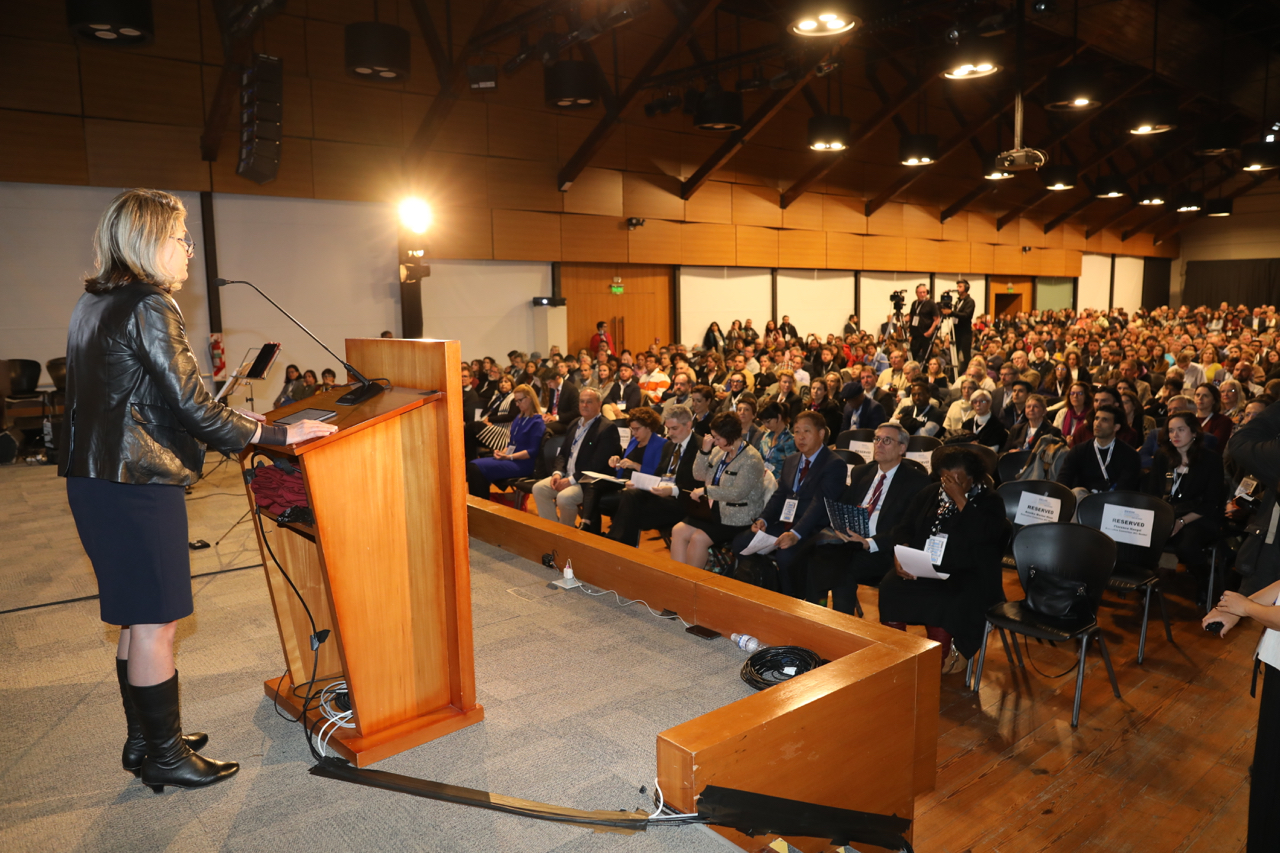
The Opening Ceremony of the IPSA World Congress 2023 in Buenos Aires was a memorable event marking the beginning of IPSA’s first on-site World Congress since 2018. The ceremony was held at the Juan Pablo II Auditorium of the Pontifical Catholic University of Argentina and was attended by over 1000 participants.
The ceremony began with a welcome word by IPSA Executive Director and Master of Ceremony, Kim Fontaine-Skronski, who welcomed Congress delegates, Program Co-chairs, the Local Organizing Committee (LOC) members, volunteers, partners, sponsors and exhibitors. Dr. Fontaine-Skronski announced that IPSA reached a record-high number of members in 2023, with a total of 4331.
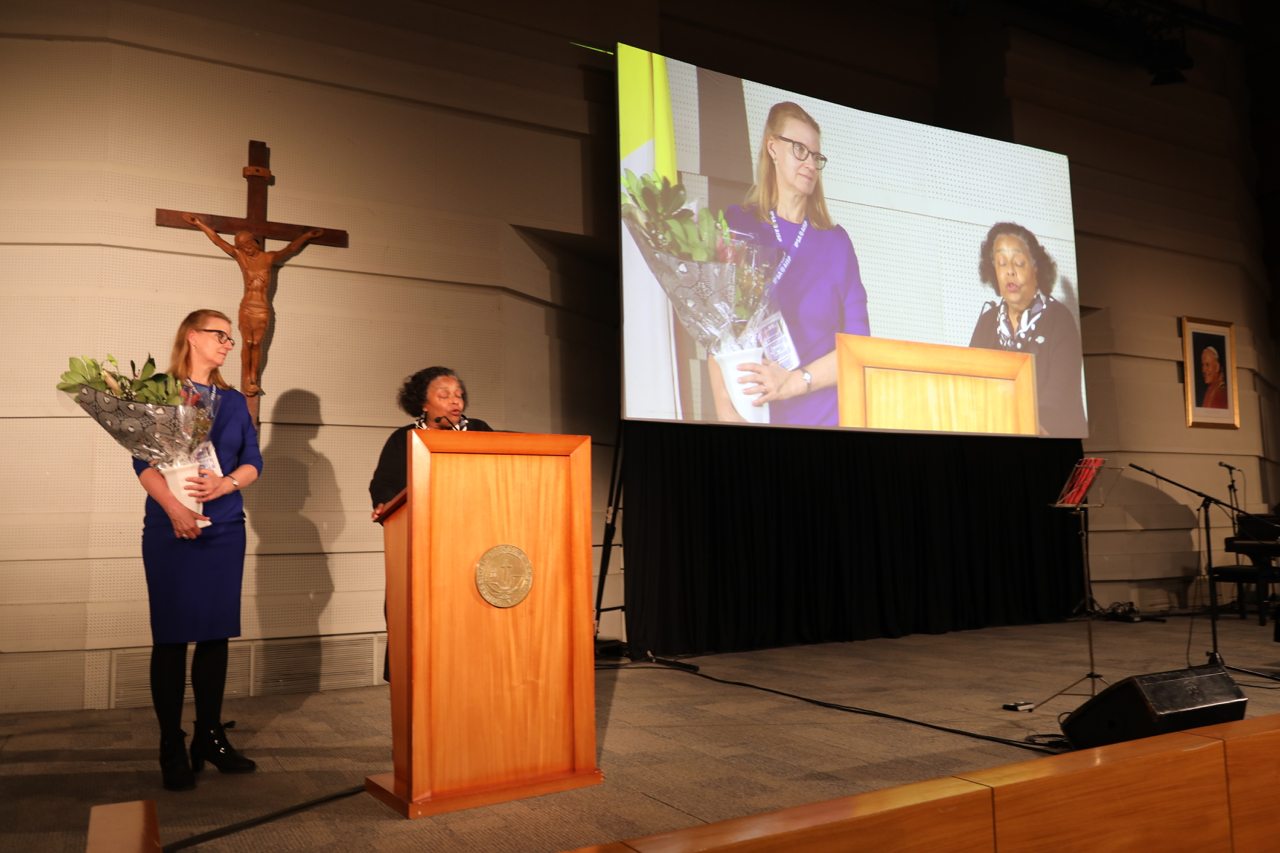 Dr. Fontaine-Skronski then introduced IPSA President Dianne Pinderhughes, who delivered the opening speech and thanked the LOC and its Co-chairs Martín D’Alessandro and María Laura Perera Taricco for their commitment and diligent efforts in organizing the Congress. She also thanked the Program Co-Chairs, Theresa Reidy and Euiyoung Kim, for their excellent work in designing a diverse and inclusive program that covered a wide range of topics and perspectives. She invited IPSA Past President Marianne Kneuer to the stage to recognize her commitment to IPSA for over a decade and her dedication to the success of the Association.
Dr. Fontaine-Skronski then introduced IPSA President Dianne Pinderhughes, who delivered the opening speech and thanked the LOC and its Co-chairs Martín D’Alessandro and María Laura Perera Taricco for their commitment and diligent efforts in organizing the Congress. She also thanked the Program Co-Chairs, Theresa Reidy and Euiyoung Kim, for their excellent work in designing a diverse and inclusive program that covered a wide range of topics and perspectives. She invited IPSA Past President Marianne Kneuer to the stage to recognize her commitment to IPSA for over a decade and her dedication to the success of the Association.
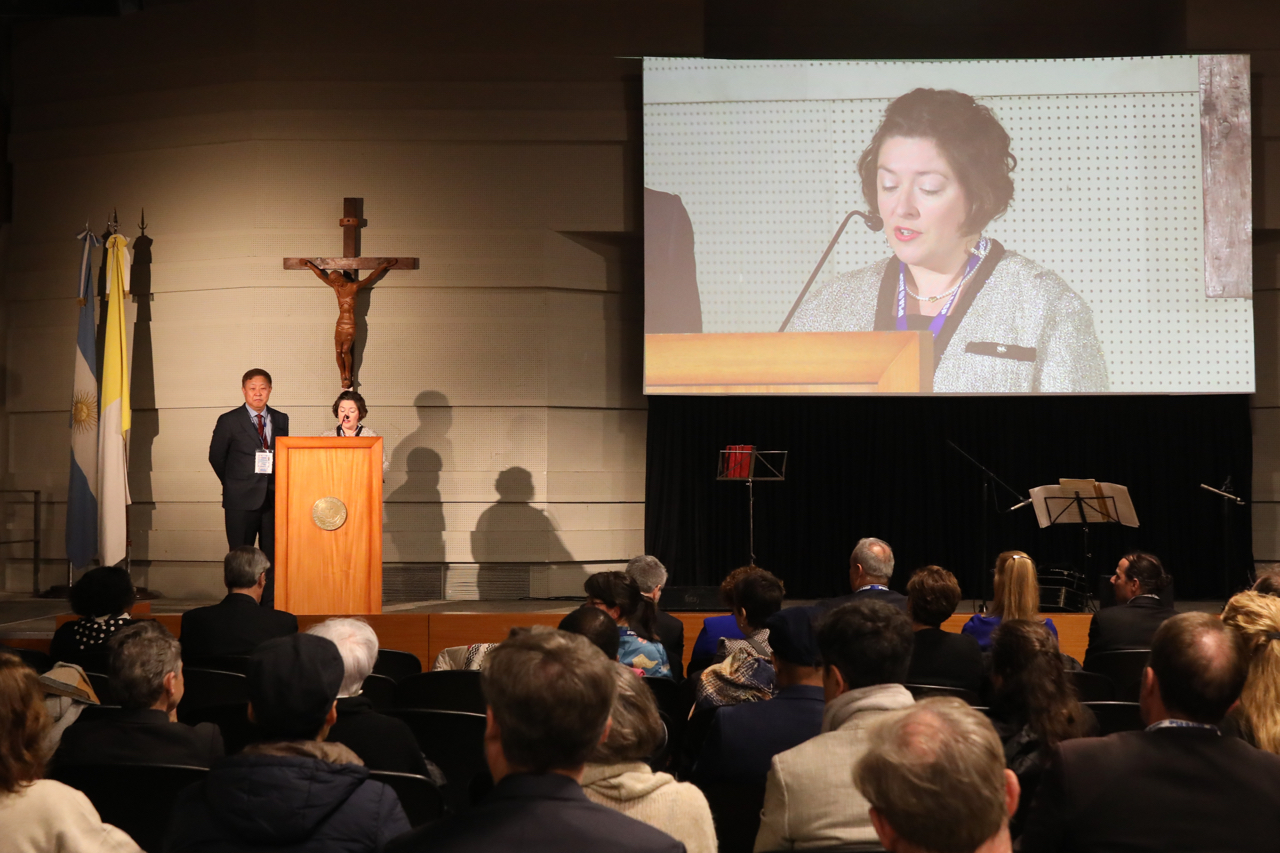 The next speakers were Program Co-chairs Euiyoung Kim and Theresa Reidy, who presented an overview of the Congress program. Prof. Kim noted that a total of 5200 paper proposals were submitted, which was a huge achievement after the challenges of the COVID years. Drawing from a Confucian quote, he expressed how the Congress is a great opportunity for political science enthusiasts to share what they have learned and practiced, while getting the chance to see colleagues and friends from far places. Then, Theresa Reidy explained that although the past three years have been particularly difficult and trying due to the COVID-19 pandemic, they have also shown the resilience of people and politics. She recounted how, after three years of uncertainty and meeting with Euiyoung Kim and other Executive Committee members over Zoom, it is a very satisfying and joyous feeling to finally be seeing the fruits of their labour in perso
The next speakers were Program Co-chairs Euiyoung Kim and Theresa Reidy, who presented an overview of the Congress program. Prof. Kim noted that a total of 5200 paper proposals were submitted, which was a huge achievement after the challenges of the COVID years. Drawing from a Confucian quote, he expressed how the Congress is a great opportunity for political science enthusiasts to share what they have learned and practiced, while getting the chance to see colleagues and friends from far places. Then, Theresa Reidy explained that although the past three years have been particularly difficult and trying due to the COVID-19 pandemic, they have also shown the resilience of people and politics. She recounted how, after three years of uncertainty and meeting with Euiyoung Kim and other Executive Committee members over Zoom, it is a very satisfying and joyous feeling to finally be seeing the fruits of their labour in perso
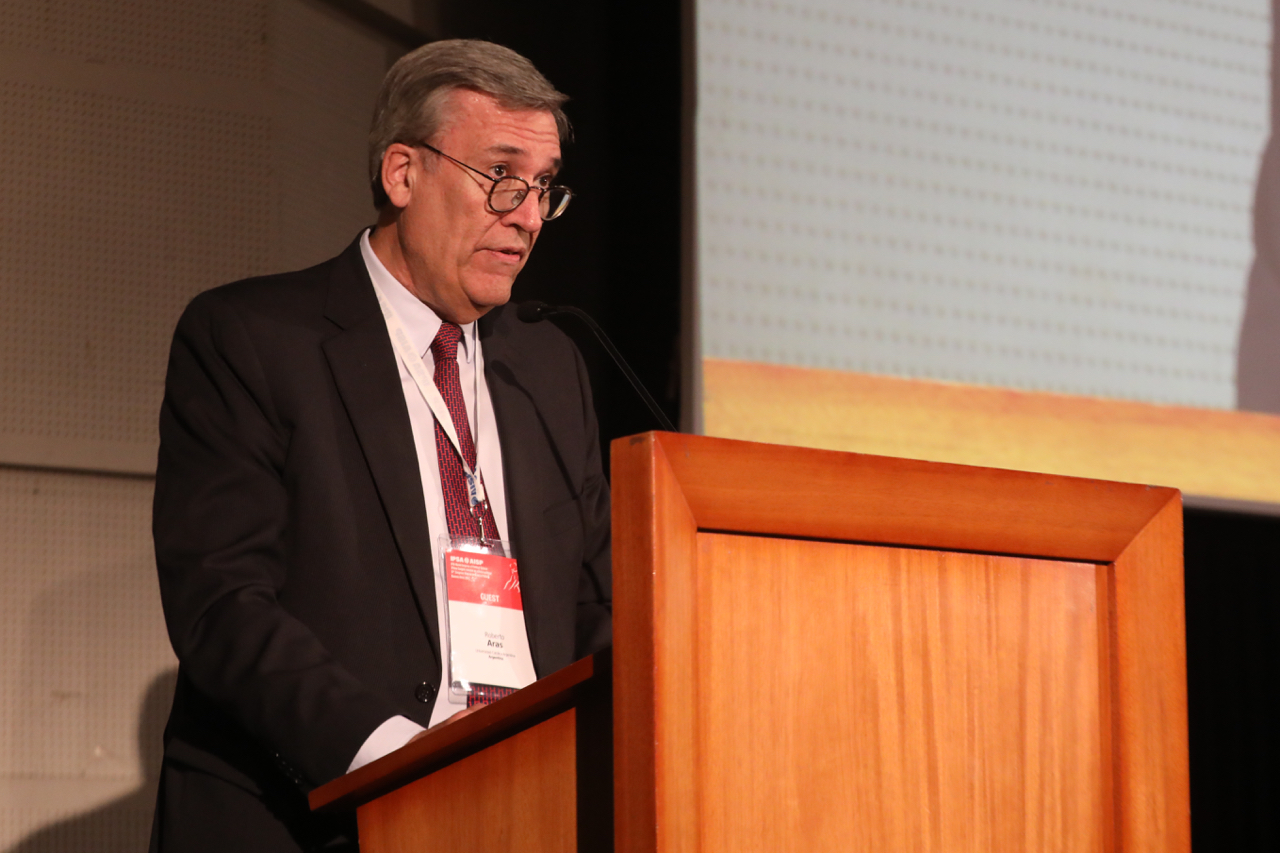 Participants also had the chance to hear Dr. Roberto Aras, Dean of the Social Sciences School at the Universidad Católica Argentina (UCA). Representing the President of UCA, Dr. Aras highlighted the long-standing collaboration between UCA and the Argentine Society of Political Analysis (SAAP) and that the University was proud to extend this relationship to IPSA as well. Dr. Aras emphasized the important role of political science in promoting peace and democratic citizenship. He expressed his gratitude for all participants that have come to the Congress to collaborate and grow intellectually.
Participants also had the chance to hear Dr. Roberto Aras, Dean of the Social Sciences School at the Universidad Católica Argentina (UCA). Representing the President of UCA, Dr. Aras highlighted the long-standing collaboration between UCA and the Argentine Society of Political Analysis (SAAP) and that the University was proud to extend this relationship to IPSA as well. Dr. Aras emphasized the important role of political science in promoting peace and democratic citizenship. He expressed his gratitude for all participants that have come to the Congress to collaborate and grow intellectually.
 Martín D’Alessandro, co-chair of the LOC, then took the stage. He noted the significant Latin American contributions to the field of political science and announced that this Congress contains over eleven sessions on Latin American topics, nine sessions in Spanish, and one in Portuguese. Dr. D’Alessandro also spoke about challenges that the field of political science is currently facing, including hyper-specialization, factionalism, and how political scientists are no longer exclusively researchers and professors. Dr. D’Alessandro concluded by thanking all parties who contributed to the organization and the execution of the Congress, including the Argentine political science association’s President Gustavo Dufour.
Martín D’Alessandro, co-chair of the LOC, then took the stage. He noted the significant Latin American contributions to the field of political science and announced that this Congress contains over eleven sessions on Latin American topics, nine sessions in Spanish, and one in Portuguese. Dr. D’Alessandro also spoke about challenges that the field of political science is currently facing, including hyper-specialization, factionalism, and how political scientists are no longer exclusively researchers and professors. Dr. D’Alessandro concluded by thanking all parties who contributed to the organization and the execution of the Congress, including the Argentine political science association’s President Gustavo Dufour.
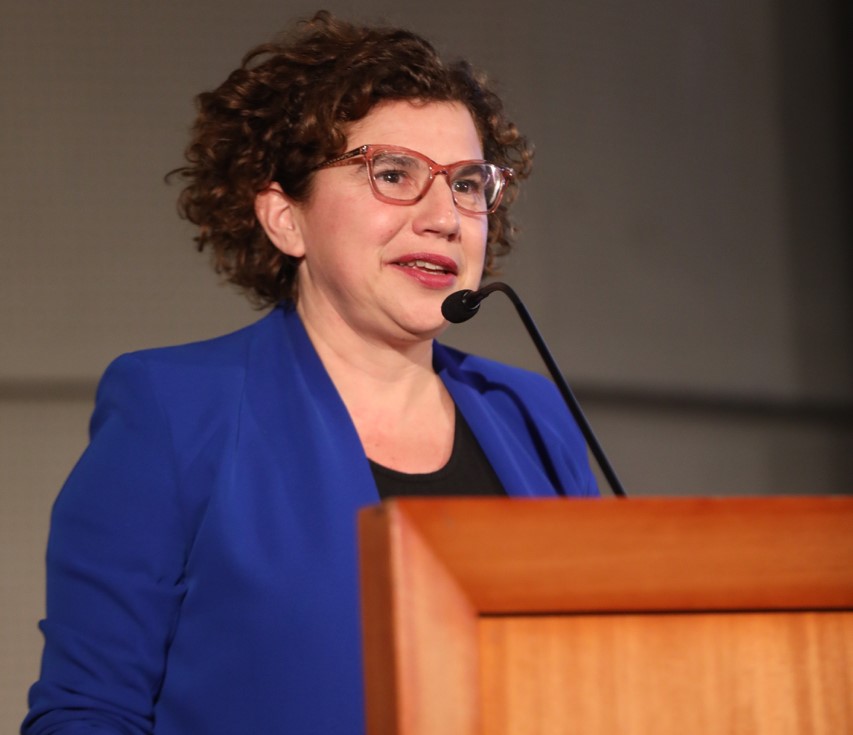 Next, the Minister of International Affairs of the City of Buenos Aires, Julia Pomares, gave a speech on behalf of the Mayor of Buenos Aires. A Doctor of Political Science herself, she expressed her appreciation that this event was being held in her home city, Buenos Aires. She mentioned that Argentina has not been immune to waves of populism and that many challenges have shaped Argentinian politics. She finished by wishing all participants a pleasant stay and experience in the city.
Next, the Minister of International Affairs of the City of Buenos Aires, Julia Pomares, gave a speech on behalf of the Mayor of Buenos Aires. A Doctor of Political Science herself, she expressed her appreciation that this event was being held in her home city, Buenos Aires. She mentioned that Argentina has not been immune to waves of populism and that many challenges have shaped Argentinian politics. She finished by wishing all participants a pleasant stay and experience in the city.
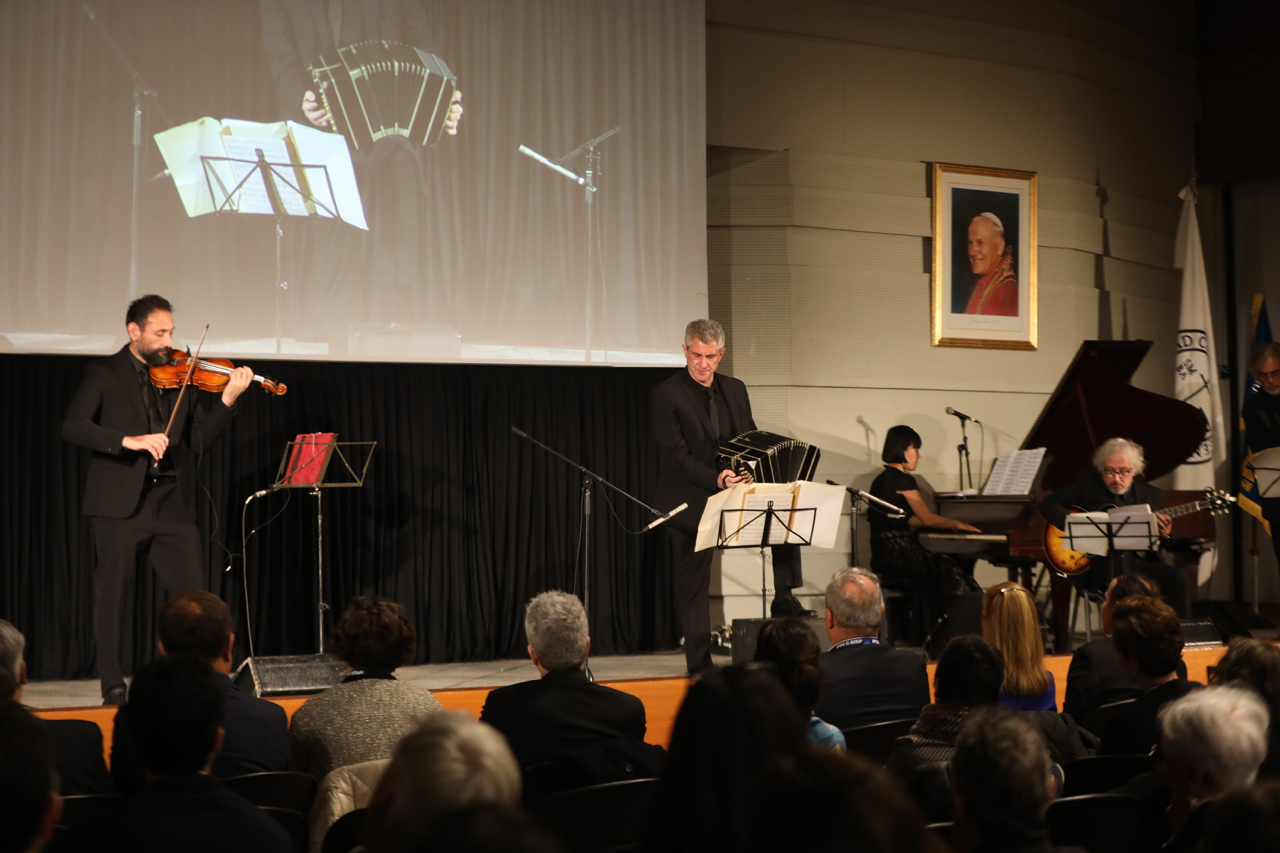
Finally, the ceremony featured a live performance by the Astor Piazzolla Quintet, a musical ensemble that continues the legacy of the Argentine composer Astor Piazzolla, who revolutionized tango with his innovative style. The quintet consists of five virtuoso musicians who play bandoneon, violin, piano, guitar and double bass, following Piazzolla's original arrangements. The audience enjoyed their expressive and sophisticated interpretation of Piazzolla's compositions.
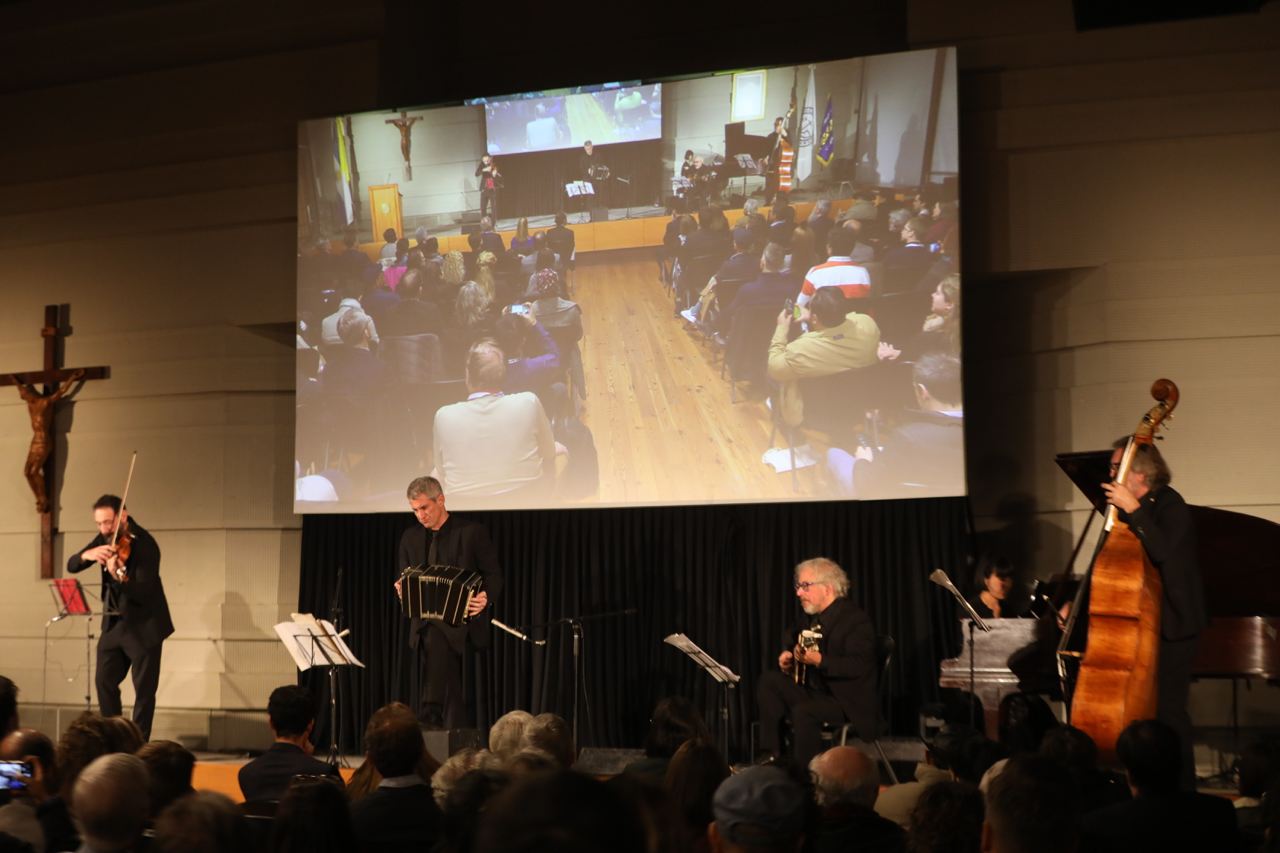

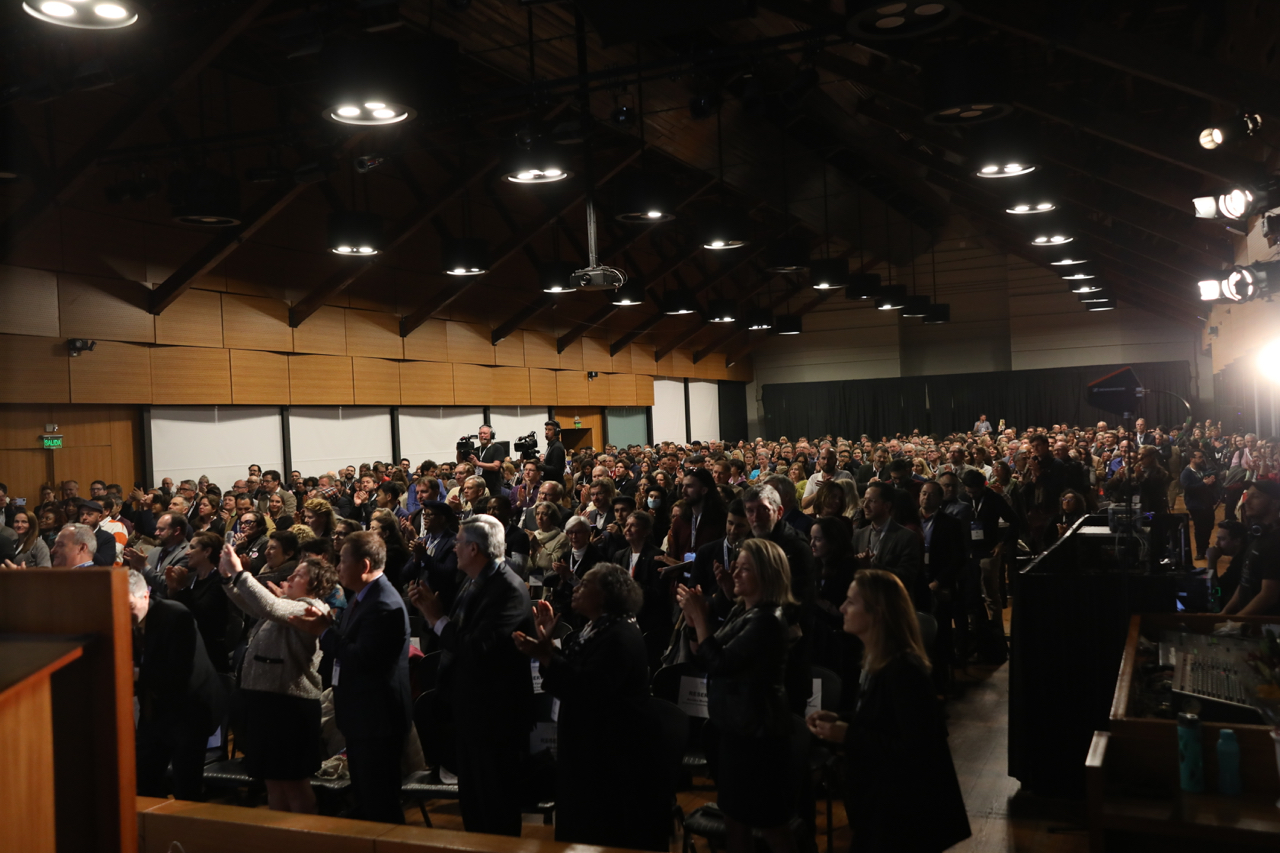
Video
Cocktail Reception
The opening ceremony was followed by a cocktail reception.
